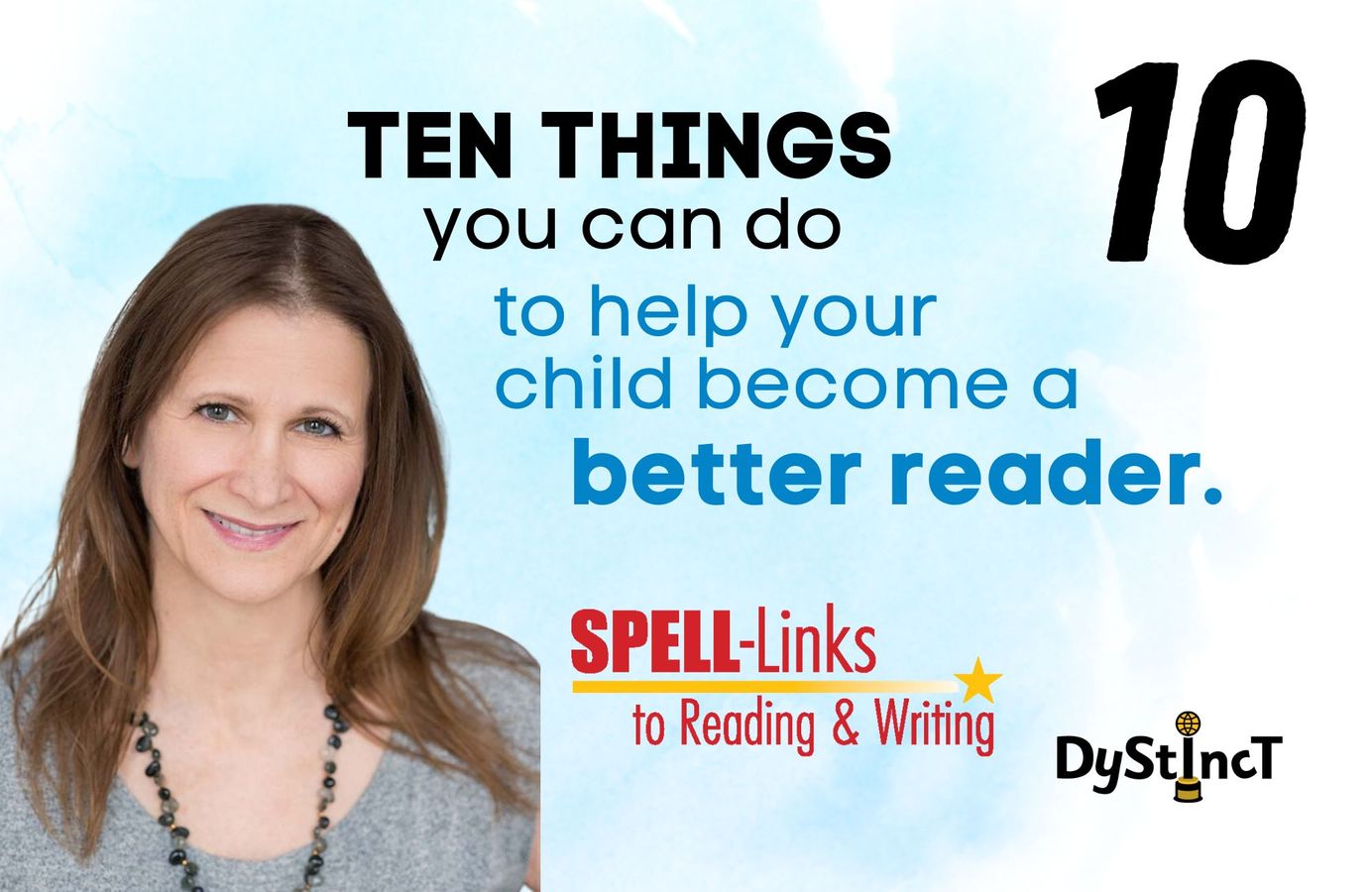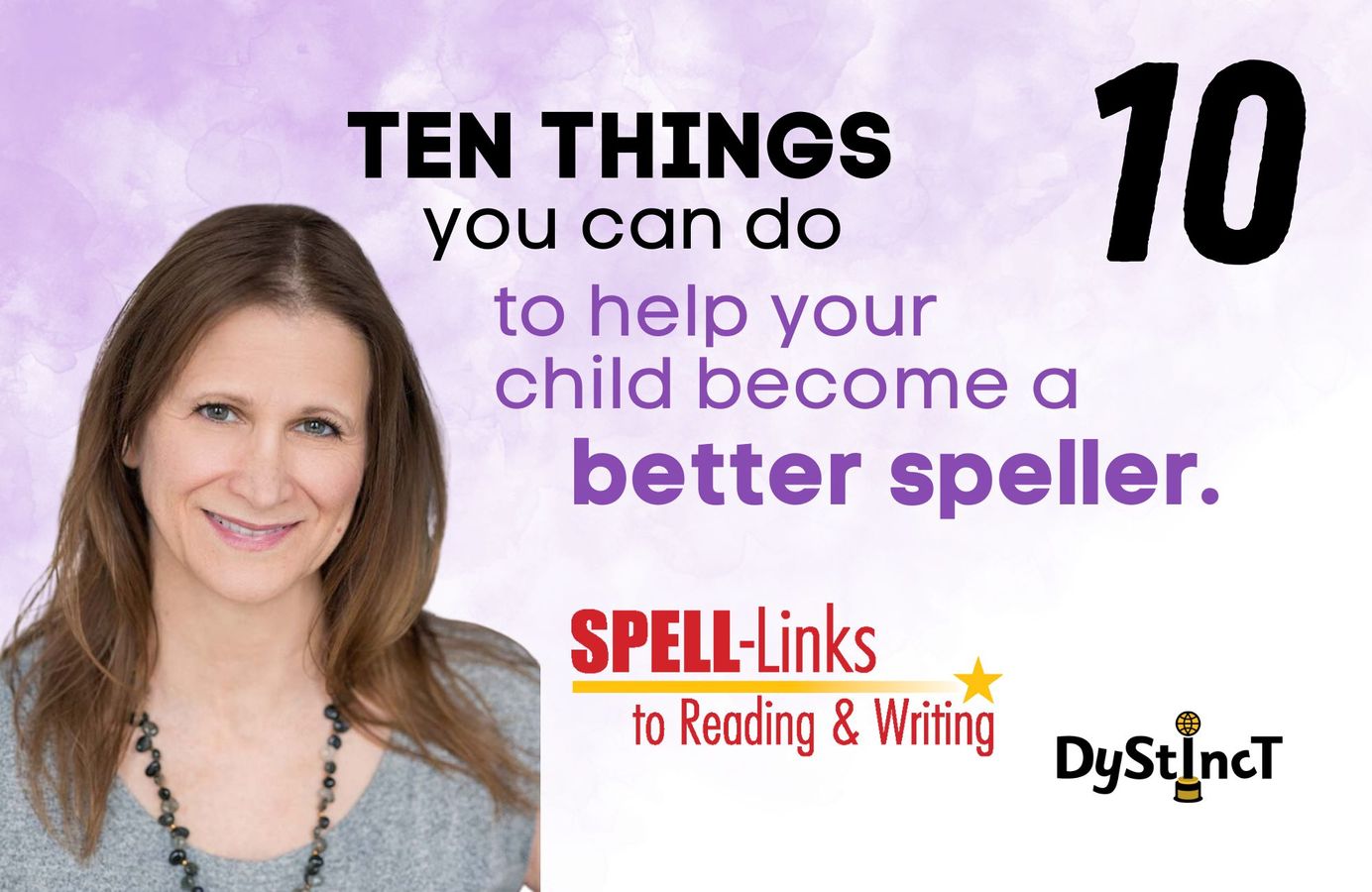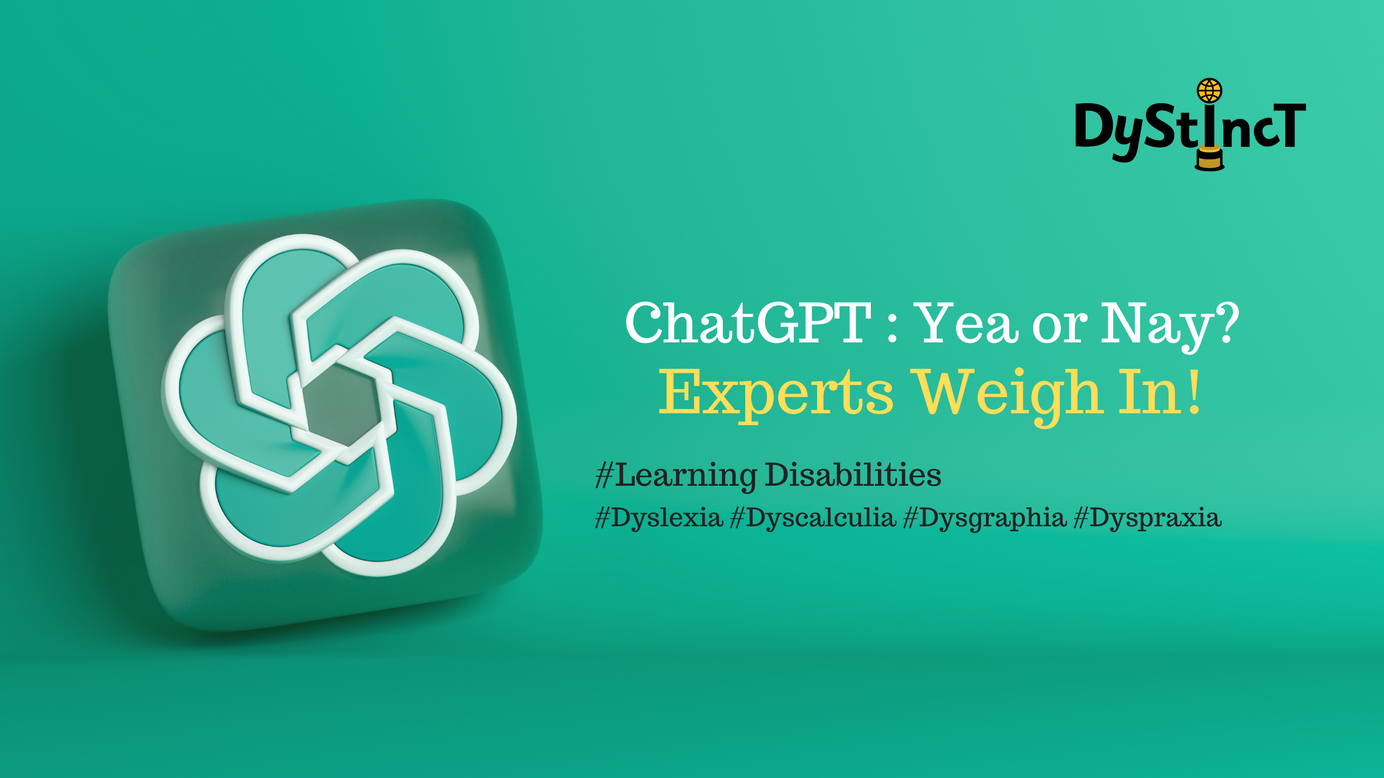
ChatGPT for students with Dyslexia? Expert Opinion: Examining the use of ChatGPT as an Assistive Technology Tool for Students with Learning Disabilities
Experts in the field of Learning Disabilities (dyslexia, dyscalculia, dyspraxia and dysgraphia) share their opinions on the use of ChatGPT as an assistive technology tool for students with learning disabilities.
#Dyslexia #Dyscalculia #Dysgraphia #Dyspraxia #ChatGPT #ArtificialIntelligence #AI #AssistiveTechnology
As parents and educators of children with learning disabilities, we rely heavily on technology to support our struggling students. Anything that can lighten their load is a welcome addition to their Assistive Technology toolkit. However, as technology continues to evolve at breakneck speed, the latest advance - AI writing tools - has sparked a heated debate about their potential to transform education. Over the past year, many such tools have become commercially available, but the conversation reached new heights with the release of ChatGPT (Chat Generative Pre-trained Transformer - introduced on 30th November 2022 by Open AI), a free-to-use AI language model that tech-savvy students have been able to freely access. With ChatGPT at the forefront of the conversation, the debate has only intensified, leaving many wondering whether it will usher in a new era of learning or spell disaster for humanity.
For those of you who are still wondering what the hype about ChatGPT is. I asked ChatGPT to explain what it is to a tech-illiterate adult and here is the response it came up with.

I asked it to explain the same to a 5-year-old and here is the response I got:

It is free to use at the moment and fairly simple to navigate. Simple prompts are all it needs to analyse pages of information and churn out impressive essays, summaries and even poetry. However, it is still in development and can make mistakes. From tinkering around, I’ve learned that the quality of the output is largely dependent on the quality of the prompts given.
The ubiquitous acceptance of AI tools has sparked diverse opinions among parents, educators, specialists, and students themselves. While some believe that ChatGPT has the potential to level the playing field for students with learning disabilities, others are concerned that the malicious use of ChatGPT could interfere with the development of knowledge. The latest disruption to education has caused schools and universities to scramble for solutions to combat the challenges it poses. Some have entirely shunned its use while others are exploring the use of AI detection tools.
While educators panic, students rejoice, and parents worry about the future of learning, it is undeniable that AI technology is here to stay. Therefore it's essential to acknowledge that ignoring the presence of ChatGPT or other content generating AI is not a solution. You can't bury your head in the sand and hope that the technology will go away. On the contrary there will be no slowing down in the breakneck speed of advancement of AI technologies in 2023.
Expert Opinion
We asked Experts in the field of Learning Disabilities (Dyslexia, Dyscalculia, Dyspraxia, Dysgraphia) for their perspective on ChatGPT.
Here is what they had to say.
To shed more light on this debate, we reached out to experts on the Dystinct panel to gather their perspectives on the use of ChatGPT as an assistive technology tool for students with learning disabilities.
- Dianne and James Murphy (Authors & Specialists in Reading Intervention, Co-Founders of Thinking Reading)
- Eric Endlich PhD (Clinical Psychologist & Educational Consultant | Founder of Top College Consultants)
- Helen Ross PhD (Independent Educational Research Consultant, Co-Vice Chair of the British Dyslexia Association, Chair of Wiltshire Dyslexia Association)
- Jocelyn Seamer (Teacher, Author & Literacy Expert | Founder, Jocelyn Seamer Education)
- Kim Dunbar (Structured Literacy Educator, The Learning Pond)
- Kirsten Kohlmeyer (Assistive Technology Director, Redwood Literacy)
- Krista Gauthier (Founder & Executive Director of Dyslexic Edge/Sliding Doors)
- Marnie Ginsberg PhD (Literacy Consultant, Founder of Reading Simplified)
- Michele Haiken EdD (Adjunct Professor of Literacy at New York, Author & Blogger at The Teaching Factor)
- Nanci Shepardson (Director of Accessibility and Assistive Technology Resources at Wilson Language Training)
- Pledger Fedora PhD (Founder of Dyslexia Institute for Learning and Literacy)
- Rosalin Abigail Kyere-Nartey (Founder of Africa Dyslexia Organisation)
- Simon da Roza (Principal Consultant, Founder of Exceptional Learners)
- Susan E Miller (Certified Dyslexia Therapost & Director, Robinowitz Education Center)
- Svetlana Cvetkovic PhD (Reading Specialist and Researcher-practitioner)
- Tonia Glaab (Structured Literacy Specialist, Founder of Reads Well)
- Valdine Björnson EdD (Educator and Founder of Reading and Learning Clinic of Manitoba)
- Victoria Leslie (Dyslexia Specialist and Literacy Educator, FocusOnTAP)
Here is what they had to say:
Dianne and James Murphy
While developments in AI have caused both excitement and consternation, we would caution against relying on this technology as a substitute for reading or to compensate for a lack of reading skills. While Chat GPT (and, no doubt, its successors) will continue to have an enormous impact, the increasing profile of AI technology makes it more urgent than ever to consider what it is to be fully human. We consider literacy to be a particular gift to humanity, the possession of which enables independence, resilience, the acquisition of knowledge and the development of more sophisticated language skills. While the idea of relying on assistive technologies is no doubt seductive, this approach ultimately leads to our dependence not only on machines but also on those who create and configure them. We believe that everyone has the right to read, and that education should be devised in such a way that everyone is able to acquire the ability to read for themselves. While this task is more of a challenge for some students than others, with patience, skill, and determination, it is achievable. The rewards of this knowledge far surpass the superficial – and often questionable – offerings of Chat GPT.
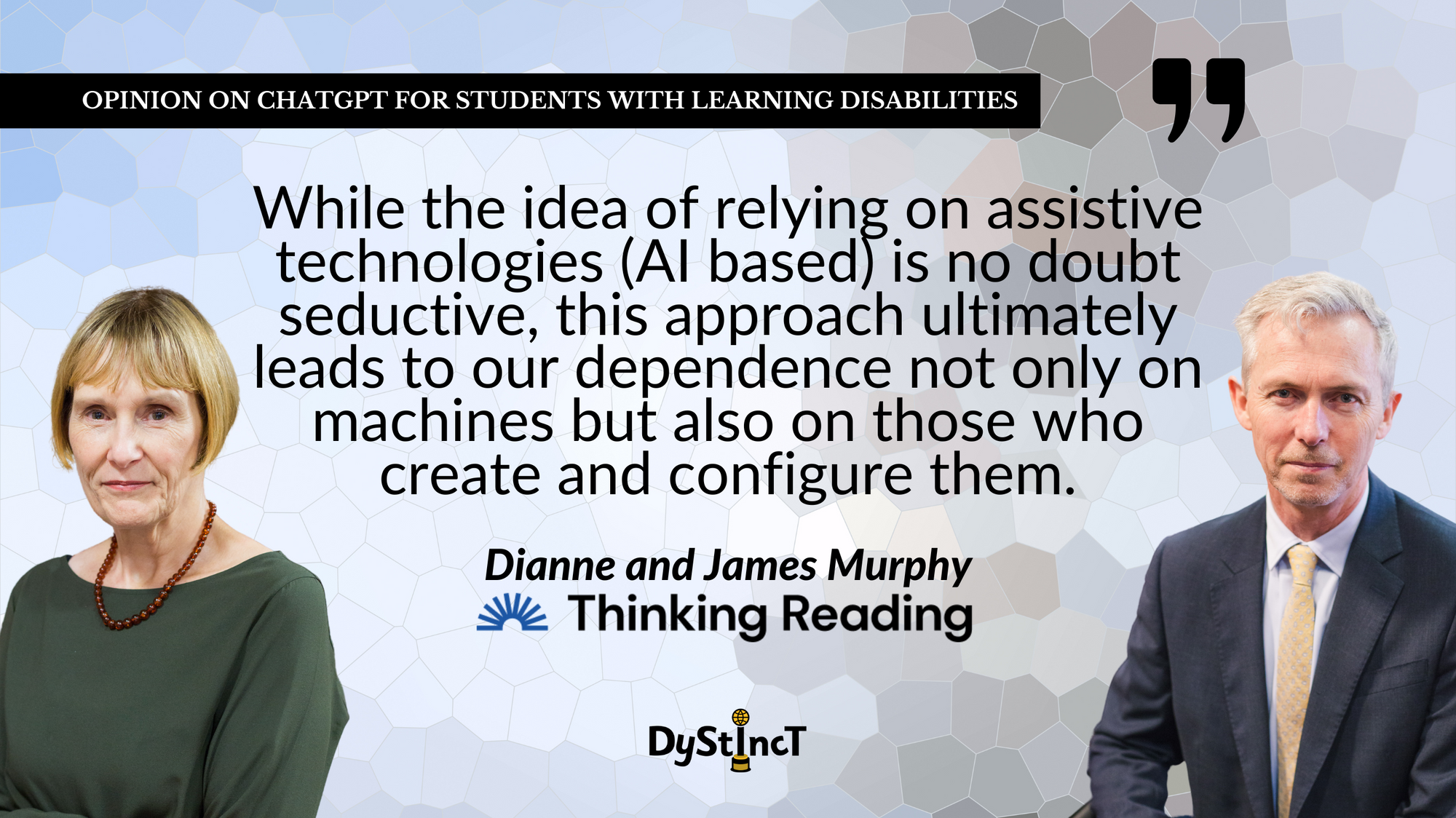

Dr Eric Endlich
TopCollegeConsultants.com | Facebook | LinkedIn | YouTube
Change scares people.
When new technology comes along – be it calculators, smartphones or GPS – often the first reaction is anxiety. So it's no surprise that the continued evolution of artificial intelligence via products such as ChatGPT triggers a number of worries.
Will students cheat?
Will they fail to develop vital thinking and communication skills?
It's wise to be cautious and thoughtful when approaching new technology. Tools can be beneficial or harmful, depending on how they're used. Calculators can be great time-savers, for example, but they don't eliminate the need for children to learn arithmetic skills.
Similarly, once students have mastered key skills in writing, research and critical thinking, there is a place for artificial intelligence tools. Students with language-based learning differences are likely to find ChatGPT especially useful. Educators are uniquely positioned to help students understand how and when to incorporate the software. Provided that ChatGPT is not a substitute for learning basic skills and is used in an honest and ethical manner, it may prove to be a boon for students and teachers alike.
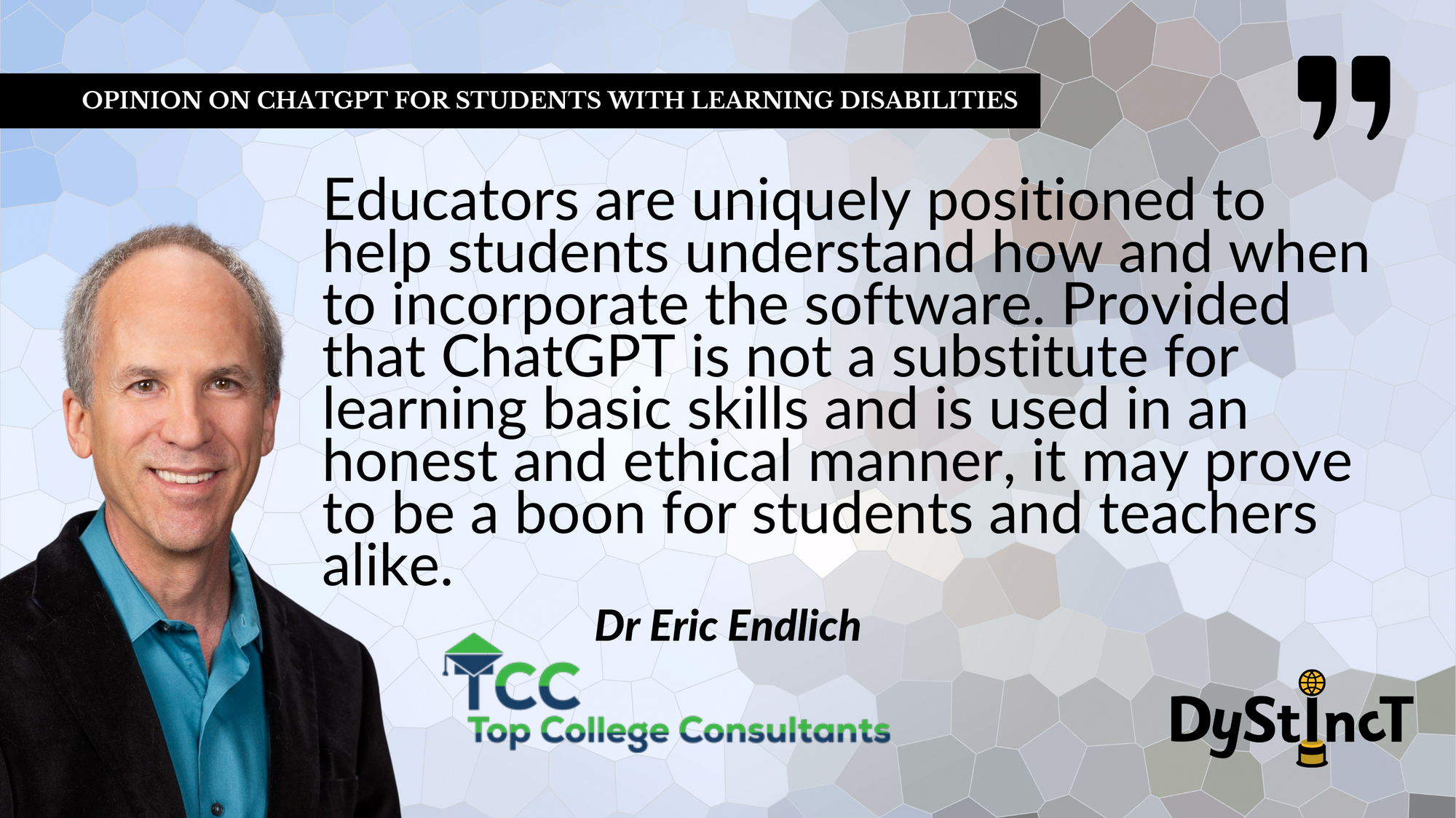

Dr Helen Ross
helensplace.co.uk | Facebook | Twitter | LinkedIn
I have become increasingly aware of ChatGPT through various professional circles I am involved in. My first encounter with it was through the consultancy work I do with an assistive technology company. My contact in the company introduced it to me as very useful for him in drafting emails and documents efficiently. As English is not his first language, using ChatGPT has been very helpful for him. For me, this is where ChatGPT also has amazing potential for supporting people with learning difficulties. They can develop ideas and craft responses to questions to use as support in forming their own.
However, the difficulty and potentially huge drawback to ChatGPT is this use. The function that makes it helpful is the function that can be incredibly problematic. Students can generate responses without doing the background work themselves and gain undue credit. This is currently happening in universities and schools.
So, for me, I think ChatGPT has some amazing functions, with the possibility to provide frameworks to support writing, and good overviews of a topic for students, provided that appropriate credit and citation is undertaken by students. I wonder whether we'll need to use plagiarism detection software with school students now?!
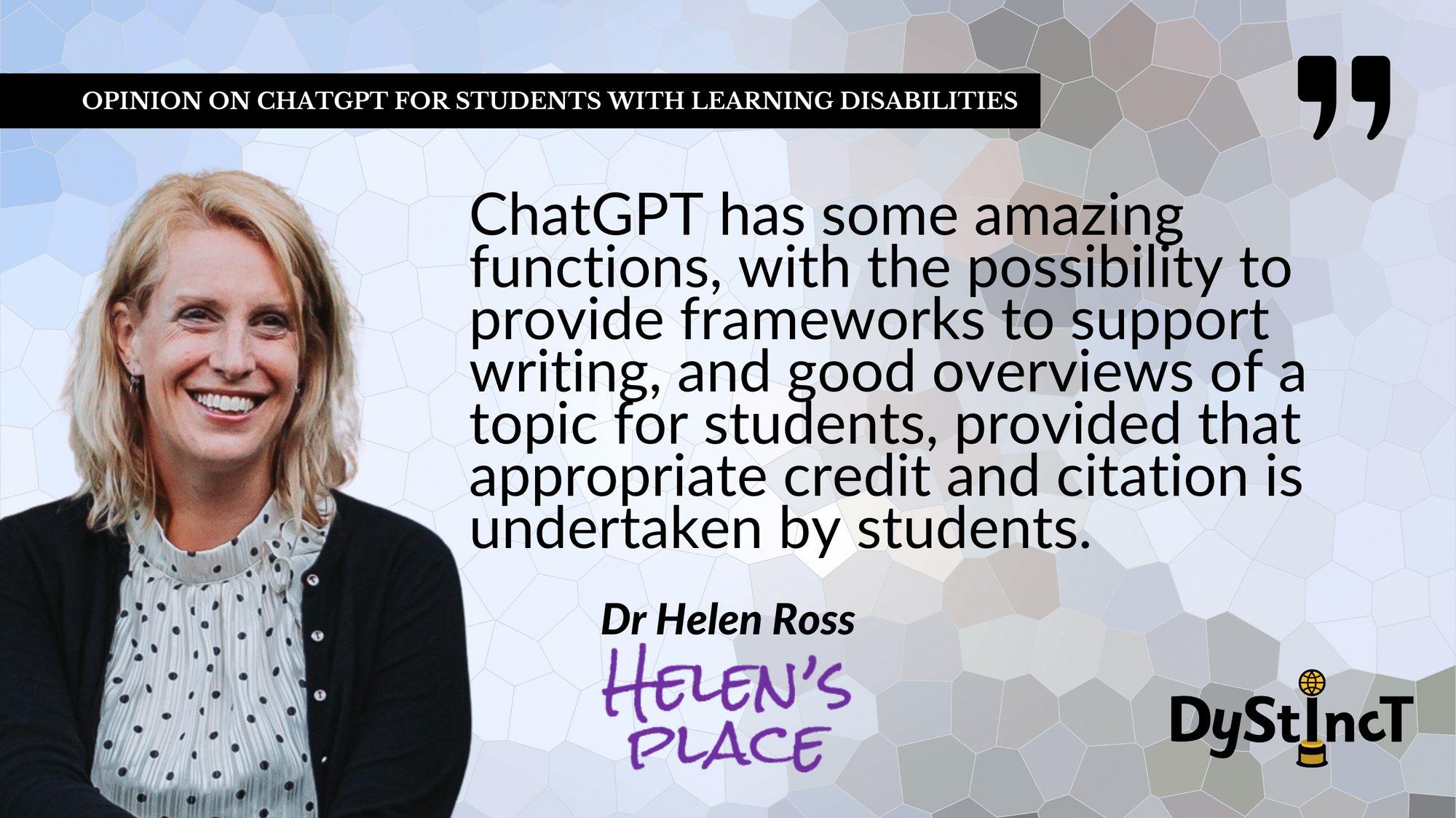

Jocelyn Seamer
JocelynSeamerEducation.com | Facebook | Instagram | Twitter
Having used ChatGPT myself, I have been quite concerned that it will be seen as a way to circumvent children's need to learn the knowledge that we know is incredibly important for both reading comprehension and effective writing. No AI can reduce the need for children to learn about the topics they are reading and writing about. It's like saying that we don't need to know times tables because we have calculators. My own view, as a primary teacher, is that I'd stick with speech to text options where the student uses it as a tool to help them demonstrate what they know when they need support. Teachers need to teach inclusively according to the Science of Learning (including managing cognitive load, a gradual release of responsibility model and including retrieval and spaced practice) so that all students can learn rich knowledge through explicit lessons.
Further, assessments should be suitably adjusted to ensure that all students are supported to be able to demonstrate learning. The fad of ChatGPT won't make that happen. Great teaching will. Our children deserve all of that and more.
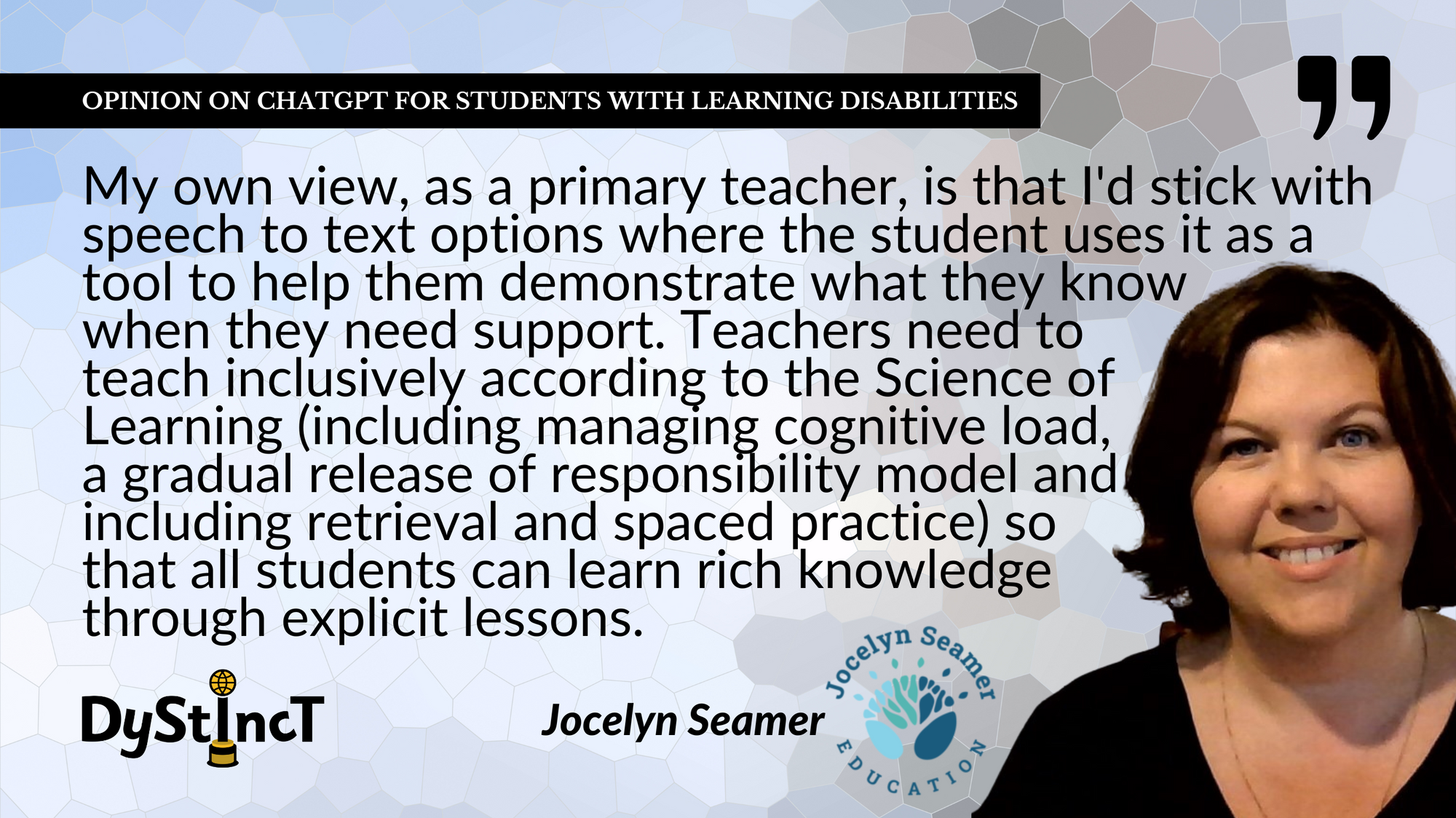

Kim Dunbar
TheLearningPond.com.au | Facebook
There is a lot to unpack when considering if Chat GPT should be used in schools and tertiary institutions. AI is here to stay whether we like it or not, so I don't think a ban on the software is the answer. The world is becoming a different place, and we need to prepare our children for life that includes AI.
My initial reaction to Chat GPT was concern mixed with a bit of fear – like many others. Won't students become lazy and simply ask the bot to create their written responses/essays? How will this impact a student's reading, writing, and comprehension skills? I did some reading on the topic and tried out the software for myself. It only took about 30 seconds and a mobile phone number to sign up to this free program. It's so easy and accessible for everyone, and I can see why it's such a heated topic in education. Introducing software like this into the school environment will mean adjustments will have to be made to the curriculum, along with changes to the way some assessments are structured.
Can this software be useful for students with learning disabilities?
Yes, Chat GPT could be used as assistive technology for students with learning disabilities. It could support students by creating outlines to be used for writing, support basic writing skills by providing suggestions for improving grammar, vocabulary and syntax, and deepen a student's understanding of a topic by providing additional information.
I'd be cautious using this software in the lower primary grades when the focus is on 'learning to read'. However, as the focus shifts to 'reading to learn', it could prove useful when used thoughtfully and in a structured way.
This software could be life-changing for students with learning disabilities, and I believe with careful consideration, it could be integrated into the education system as a useful tool.
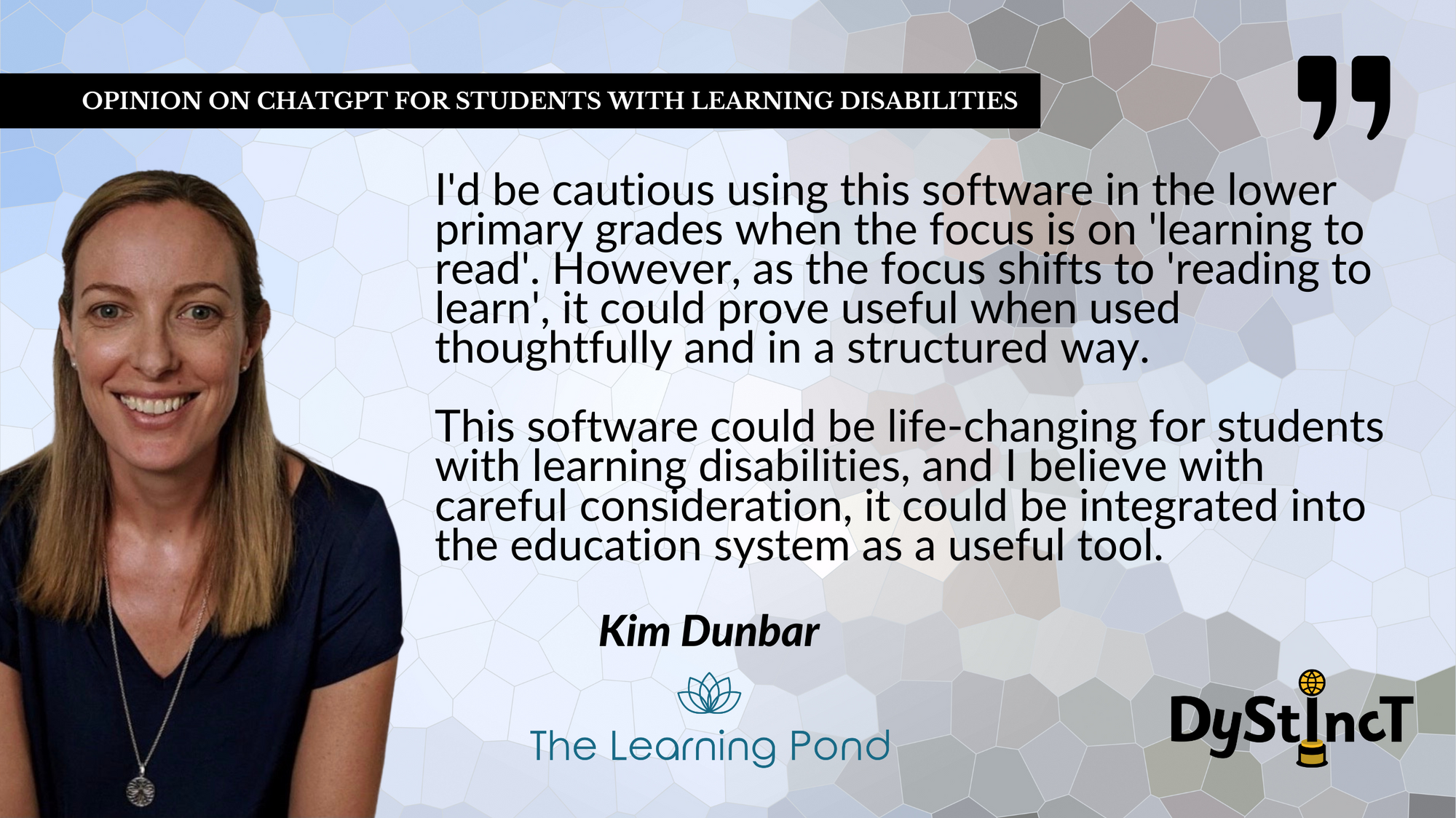

Kirsten Kohlmeyer
RedwoodLiteracy.com | Facebook | Instagram
ChatGPT: Grappling with Educational Implications
Historically, new technology, such as the telephone, television, social media, and Zoom, has been met with enthusiasm and trepidation prior to widespread adoption. Similarly, education has broadened its acceptance and use of mainstream technology. Calculators, cell phones, YouTube, and search engines are current versions of slide rules, tape recorders, encyclopedias, and card catalogs. ChatGPT goes beyond Wikipedia on steroids by culling comprehensive sources of information to generate conversational text for users. As the ramifications of this new technology are still unknown, the education world is grappling with how to harness the potential positive impacts while avoiding the negative ones.
ChatGPT ("Generative Pre-Trained Transformer'), a conversational AI language model developed by OpenAI, uses state-of-the-art language processing techniques to generate conversational text based on user input. Students can create outlines, essays, lyrics, poems, computer code, and more. New York Times writer Kevin Roose commented, "ChatGPT is, quite simply, the best artificial intelligence chatbot ever released to the general public." Is it? How will this new AI shape the face of teaching and learning?
Potential pros: ChatGPT can provide students with quick access to information, help them understand concepts at their cognitive level, and efficiently generate derivative content. This tool can decrease language barriers and make education more personalized and equitable. ChatGPT allows students to ask follow-up and clarifying questions and can provide leveled definitions as well as summaries. When asked, it can provide edits and revisions, including transitional phrases, grammar, and vocabulary support. ChatGPT goes beyond mainstream educational technology and can provide students with both scaffolding and supports that many accommodations and assistive technology tools provide. On the educator side, ChatGPT can save teachers time by generating lesson plans, mass emails, quizzes, and writing prompts. It certainly provides teachers fodder for teaching digital citizenship.
Potential cons: According to AI's website, ChatGPT can generate incorrect information, produce harmful instructions or biased content, and has limited knowledge of the world and events after 2021. The information provided is created by an algorithm and is not peer-reviewed. ChatGPT cannot answer questions not previously encountered. As a machine-learning model, it is unable to supplant teachers in their ability to provide individualized support and assess student understanding. ChatGPT does not teach students how to research, annotate, reference sources, or write. Assignments completed using text solely produced by AI do not reflect students' writing abilities and might be considered plagiarism. The ethical questions are numerous and multifaceted.
In formulating my current opinion about ChatGPT, I spoke to colleagues, and I searched the literature and the internet. I also tried ChatGPT and was amazed at the content it generated in seconds. I asked the same question and follow-up questions multiple times and got different, more comprehensive responses. While ChatGPT generated solid text related to my inquiries, I noticed an occasional lack of specificity, along with repetitive syntax patterns and vocabulary. It did not organize or represent my ideas, synthesize my thoughts, or convey my voice.
Ultimately, any tool is as good as the person using it. Teachers need to focus on both the process and the product of education.
AI-generated text will never be a substitute for pedagogical knowledge and good teaching.
AI-generated text will never be a substitute for critical reading and critical thinking.
AI-generated text cannot instil and cultivate a love of learning.
But with an open mind and creative educational practices, we can leverage the power of technological innovation to increase accessibility, educational opportunities, and enhance learning outcomes.
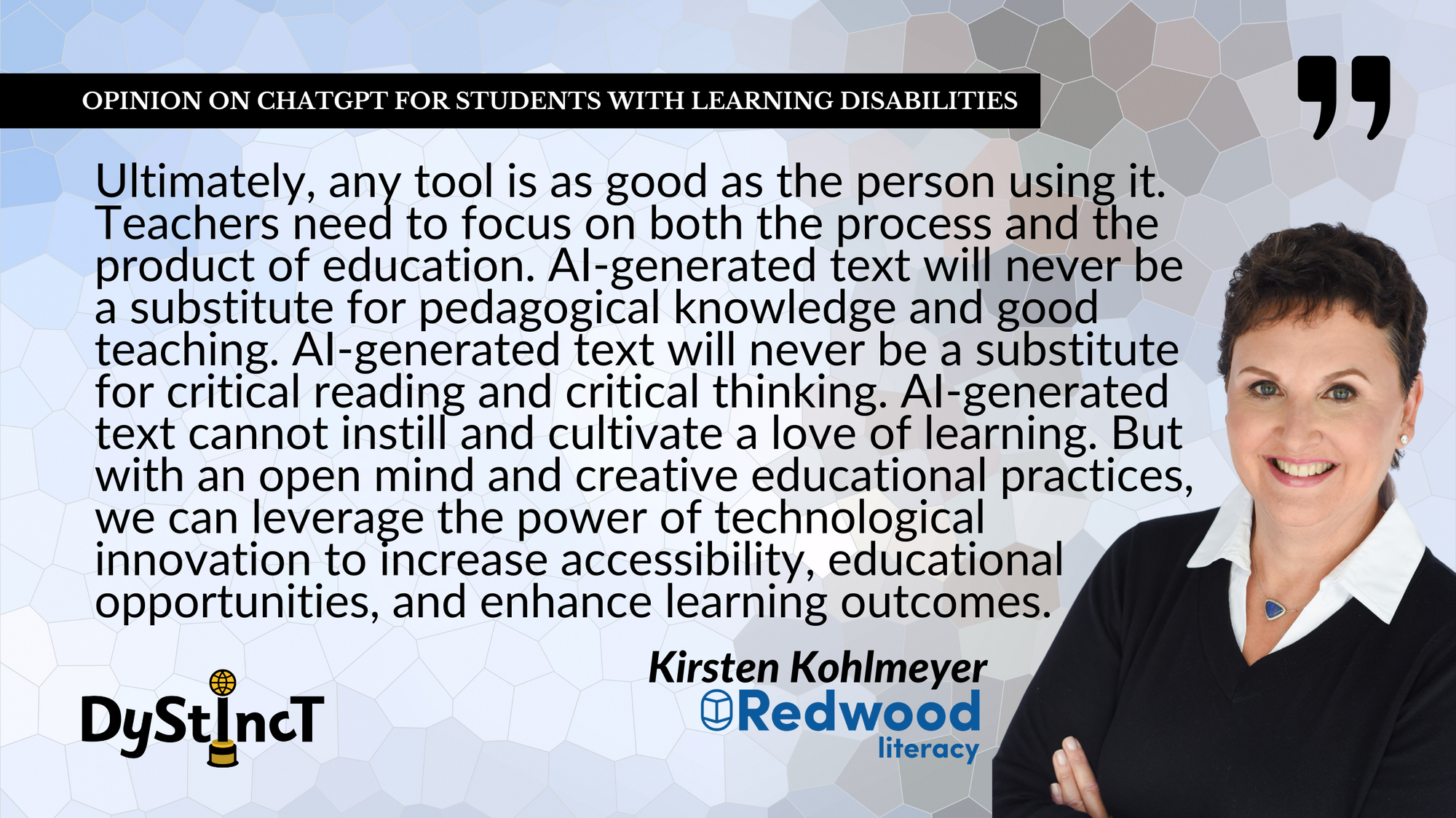

Krista Gauthier
SDSquared.org | Facebook | LinkedIn
As the Executive Director of an organization that works to level the playing field for students with dyslexia using Assistive Technology, I have received a lot of questions about the latest hot topic, ChatGPT. This new technology has deeply divided educators as to whether or not it is a bridge too far and enables rather than aids students.
My answer to whether or not it enables or aids is that it depends.
It depends on how this is implemented, whether educators understand that this technology is here to stay, and their ability to embrace rather than reject it.
I believe very strongly that if this new technology is embraced and therefore taught correctly and effectively, it can be a game changer for students who struggle with dyslexia. The debate hinges on the fact that unlike other AT tools out there, ChatGPT does present the potential problem of becoming too much of a help, allowing students to not engage their brains and instead rely too heavily on the tech, robbing them of their voice and opportunity to effectively express their own thoughts. However, if effective curricula are developed to help students use this tool in a way that allows their voice, knowledge, and skills to come through, then ChatGPT can help eliminate certain barriers that arise because of their language-based challenges and puts them on the same level as their neurotypical counterparts.
Therefore, it is imperative for all of us to embrace this technology and create programs that teach our students to navigate this new world.
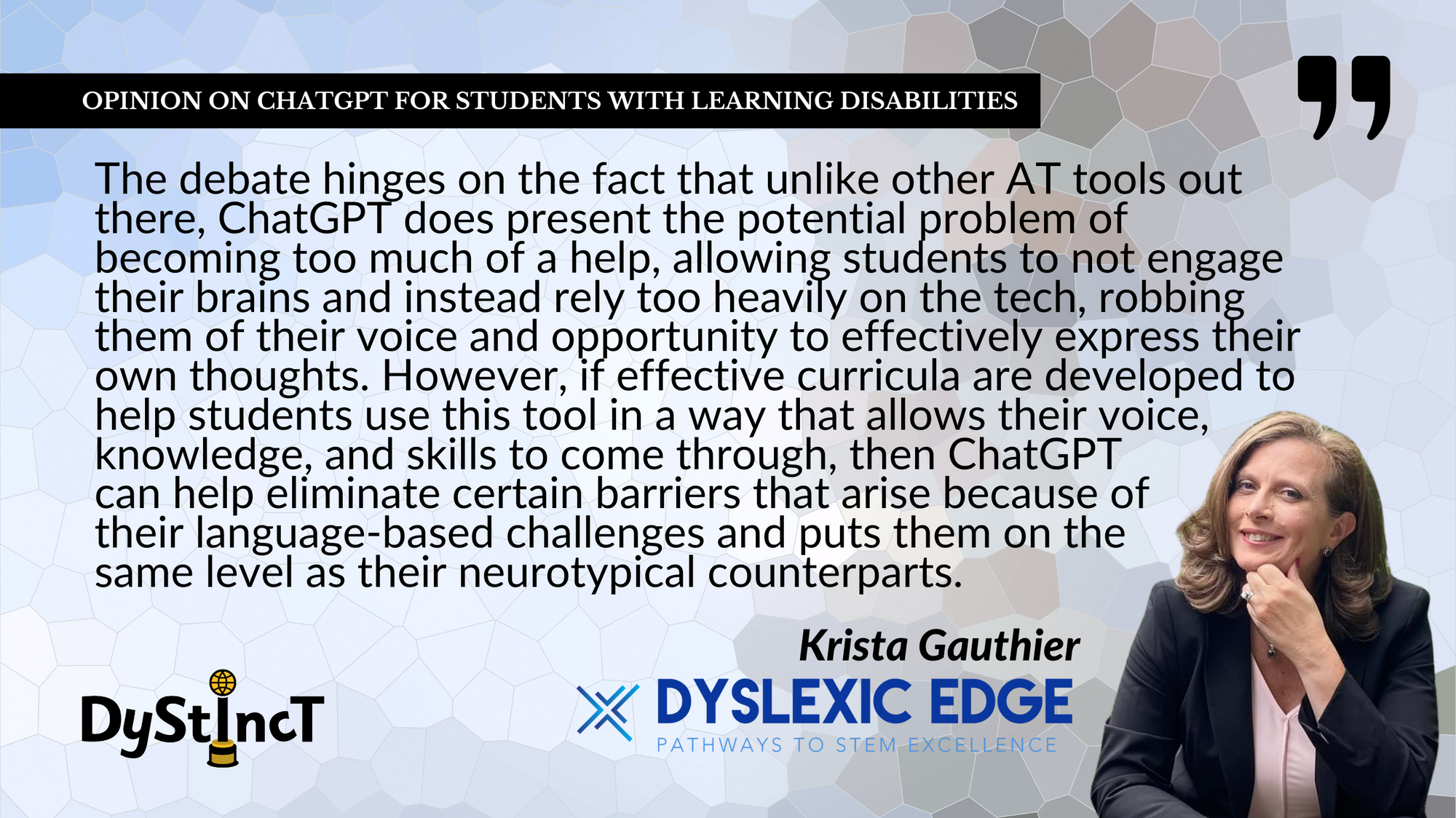

Dr Marnie Ginsberg
ReadingSimplified.com | Facebook | Instagram | Twitter | LinkedIn | YouTube
ChatGPT has been let out of the box, and there's no stuffing it back inside. Have no fear! Teachers and parents would be wise to embrace this powerful technology to support students' writing and learning.
Want to teach how to outline an essay? Ask ChatGPT to produce 3 or 5 options on a topic students have been studying. Then help them break down the structure of the essay and turn each one into an outline. Or, request for essays that the class then analyzes for transitional words and phrases. Which essay has the best coherence? For challenging critical analysis, use ChatGPT at the end of a unit to summarize a topic and analyze what parts of its output are accurate and what is lacking. How should the output be modified?
Writers model their work after reading widely. ChatGPT provides easy access to lots of writing models on almost any given topic: More models examined equals better writing. One could even study a variety of writing genres via this artificial intelligence. These ideas are merely the tip of the iceberg of ways in which ChatGPT tech can hook students--far beyond what any textbook ever could. Let's stay a step ahead of students by creatively considering how to enfold a powerful, dynamic tech into our instruction and build better writers and thinkers.
Not convinced?
Ask ChatGPT what it "thinks!"
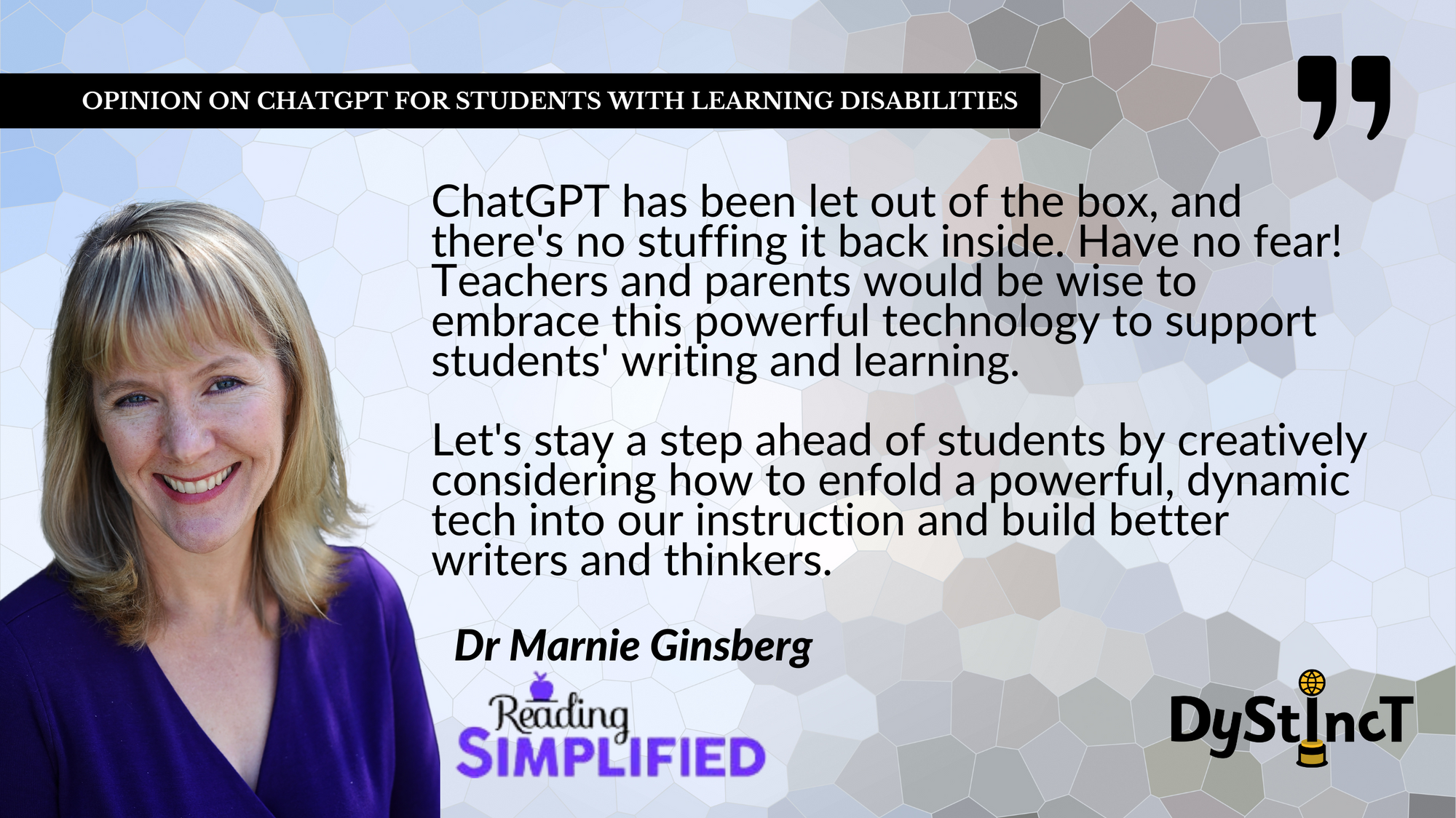

Dr Michele Haiken
TheTeachingFactor.com | Instagram | Twitter | LinkedIn
When rock and roll music made its debut, there was hysteria that it would corrupt youth. Television was first thought to rot the minds of its viewers. In 1981 when MTV hit the airwaves, there was the same debate over a 24-hour video music channel. If we look throughout the history of inventions that pivot our civilization there has always been some hysteria and backlash. The same skepticism goes for social media apps today.
ChatGPT is no different. In fact, when I was scrolling through social media, I stopped to see a post by an edu-influencer stating that "ChatGPT is a threat to teachers and the notion of school." But before we go down the road of how ChatGPT might be a detriment to education, let's look at some positives and how educators and students might use this assistive technology to become better writers and critical thinkers.
ChatGPT is AI (artificial intelligence) that allows its users to generate text based on any topic and voice or style requested. Whereas this might sound like an amazing invention (it is!), there are also some flaws in the program. For example, the information that ChatGPT produces might not be accurate, and that is where users need to be critical of the information produced and check over the facts. Here are three ways students and educators might consider utilizing this assistive technology to be successful readers and writers.
For a student with dyslexia or other learning differences, ChatGPT can be used to assist its users with outlining a long writing assignment or essay. Then, once an outline is formed from the program, the students can use their knowledge and research to expand their writing and complete the assignments using the ChatGPT response for sentence starters and essay organizer. The key here is building on and making better what was produced.
Teachers might create an essay in front of students using ChatGPT. Then, students can analyze the strengths and weaknesses of the writing produced. Is the piece accurate? Does the writing contain the elements of a great essay? What is missing? What can be added to improve the writing? How does the voice of the essay sound, artificial or human? Students might even give the essay a grade.
Need a study buddy before a big test or exam? Both teachers and students can use ChatGPT to create review questions. ChatGPT can even make a sample test if you ask it, and it is a great way to practice and study to ace the test.
The possibilities are endless and consider ChatGPT to help assist its users in leveling up their written communication skills and becoming savvy consumers of information.
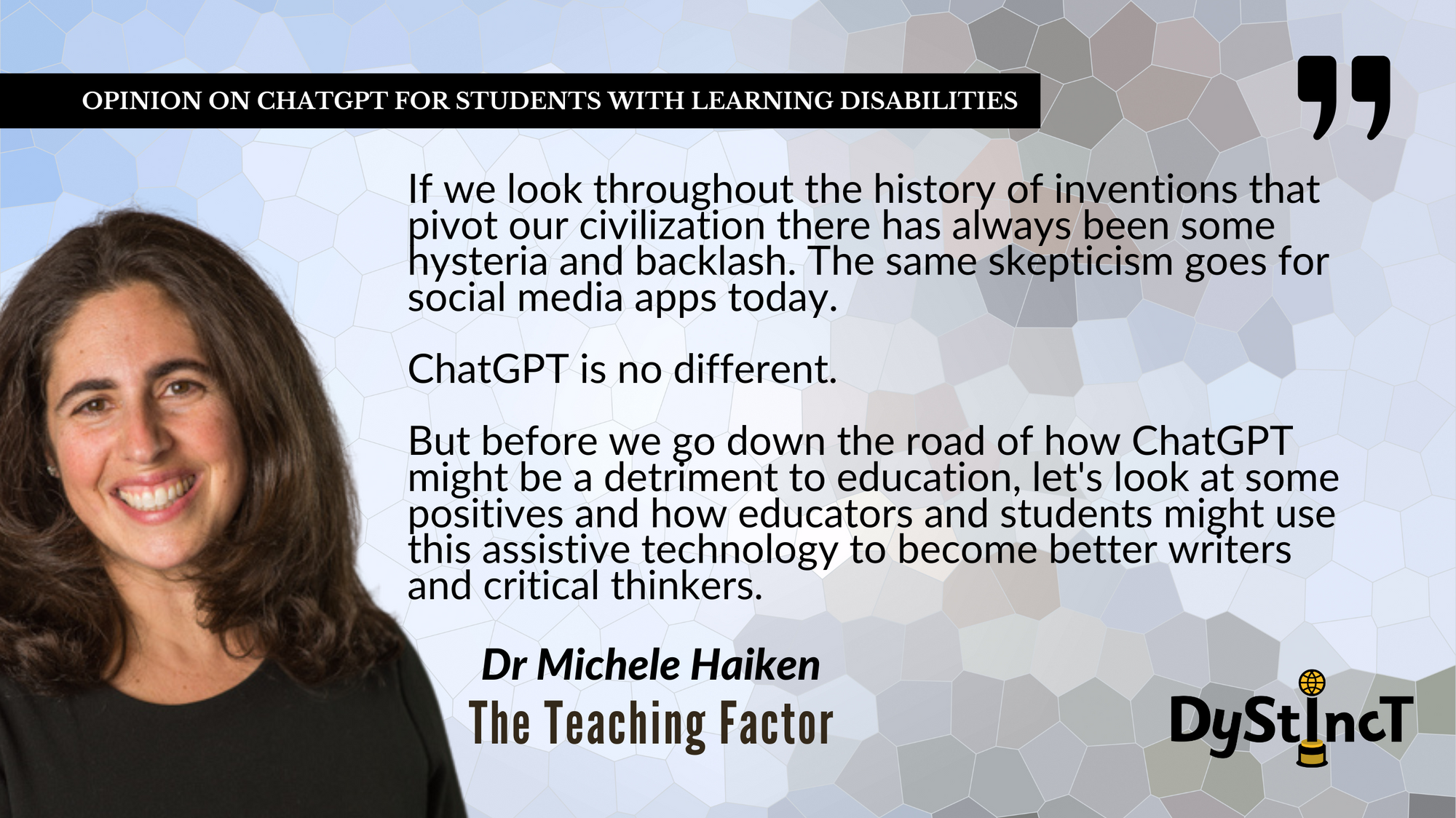

Nanci Shepardson
Nanci is a Senior Educational Technologist, Director of Accessibility and Assistive Technology Resources at Wilson Language Training, and specializes in dyslexia, high incidence learning disabilities, and assistive technology.
WilsonLanguage.com | Facebook | Twitter | LinkedIn
New technologies are often viewed with heavy scrutiny when they enter a classroom. In the 1970s, the impact a calculator would have on student learning was much debated. Now, students take high-stakes tests with a calculator. The electronic device is an integral part of math classes all over the world. Spell checkers had a similar response; now, spell-checking technology is everywhere and widely used. What is most critical about these aides is how and when they are used.
ChatGPT, a chatbot developed by OpenAI, has the power to generate written work for students. Many educators are concerned about impact on student outcomes. Banning it, especially without discussion, only makes the software enticing to students. Like the calculator and spell checkers, ChatGPT can be a tool. Instead of using it to bypass learning or skip an opportunity to apply a concept, the chatbot can be used as a model or to accomplish tasks with more efficiency. Students can be taught how to use a critical eye to review text, use generated text to suggest grammatical corrections, and easily generate ideas while brainstorming or practice editorial marks.
ChatGPT has the potential to scaffold the writing process for students who struggle. Much like text-to-speech, speech-to-text, and word prediction, it has the power to facilitate struggling writers to show what they know. The chatbot shouldn't be used in isolation, but it should and can be used as a starting point. As technology and AI are expanding, ChatGPT will likely have competing products soon. Let's empower and prepare our students to use this new tool.
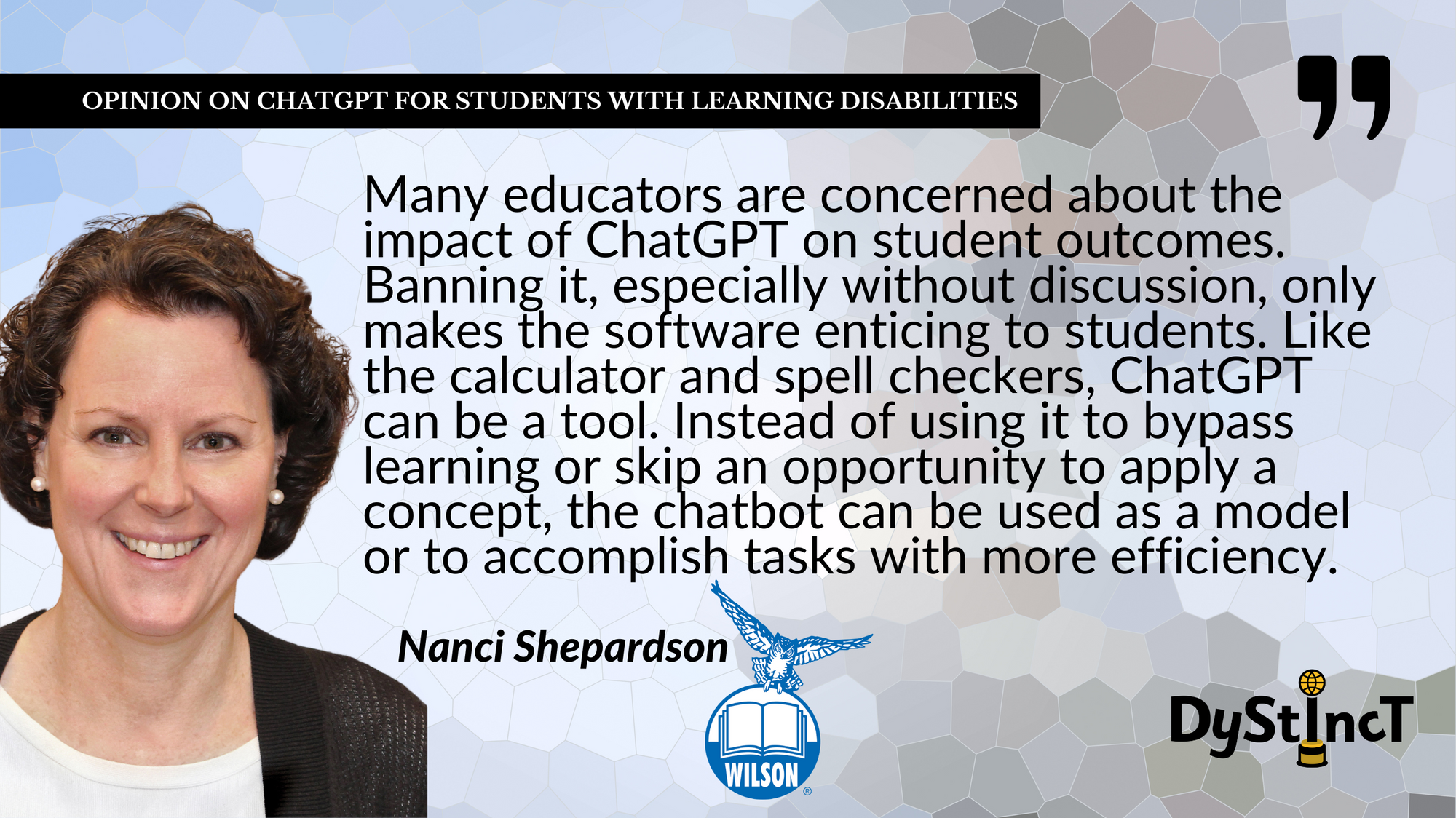

Dr Pledger Fedora
DyslexiaLiteracy.com | Instagram | Twitter | LinkedIn
The use of assistive technology is extremely beneficial for many students with dyslexia. The assistive technology devices currently in use, such as text-to-speech software, spell checkers, and smart pens, make it possible for students with dyslexia to keep up with their age-level peers by providing support in areas of weakness.
ChatGPT (Chat Generative Pre-trained Transformer), which was introduced on November 30, 2022, is spreading rapidly around the world.
Major concerns from schools that have banned its use focus on cheating and the fact that using ChatGPT has the potential to undermine critical thinking and problem-solving skills. ChatGPT has the potential to support students with dyslexia, but it also has the potential to produce an unintended effect in that if overused, students with dyslexia may become dependent on it. This dependence could potentially impede their development, especially in writing skills, since ChatGPT is not assisting the student but doing the work for the student.
For students with dyslexia, our goal should be to teach students how to learn by providing the tools to help them be independent learners. Using a cognitive-based approach such as Orton-Gillingham to teach individuals with dyslexia to read, write, and spell empowers students to have confidence in their ability to independently read, spell, and communicate effectively through written text.
Based on the concerns addressed above, ChatGPT may not be the most beneficial for individuals with dyslexia.
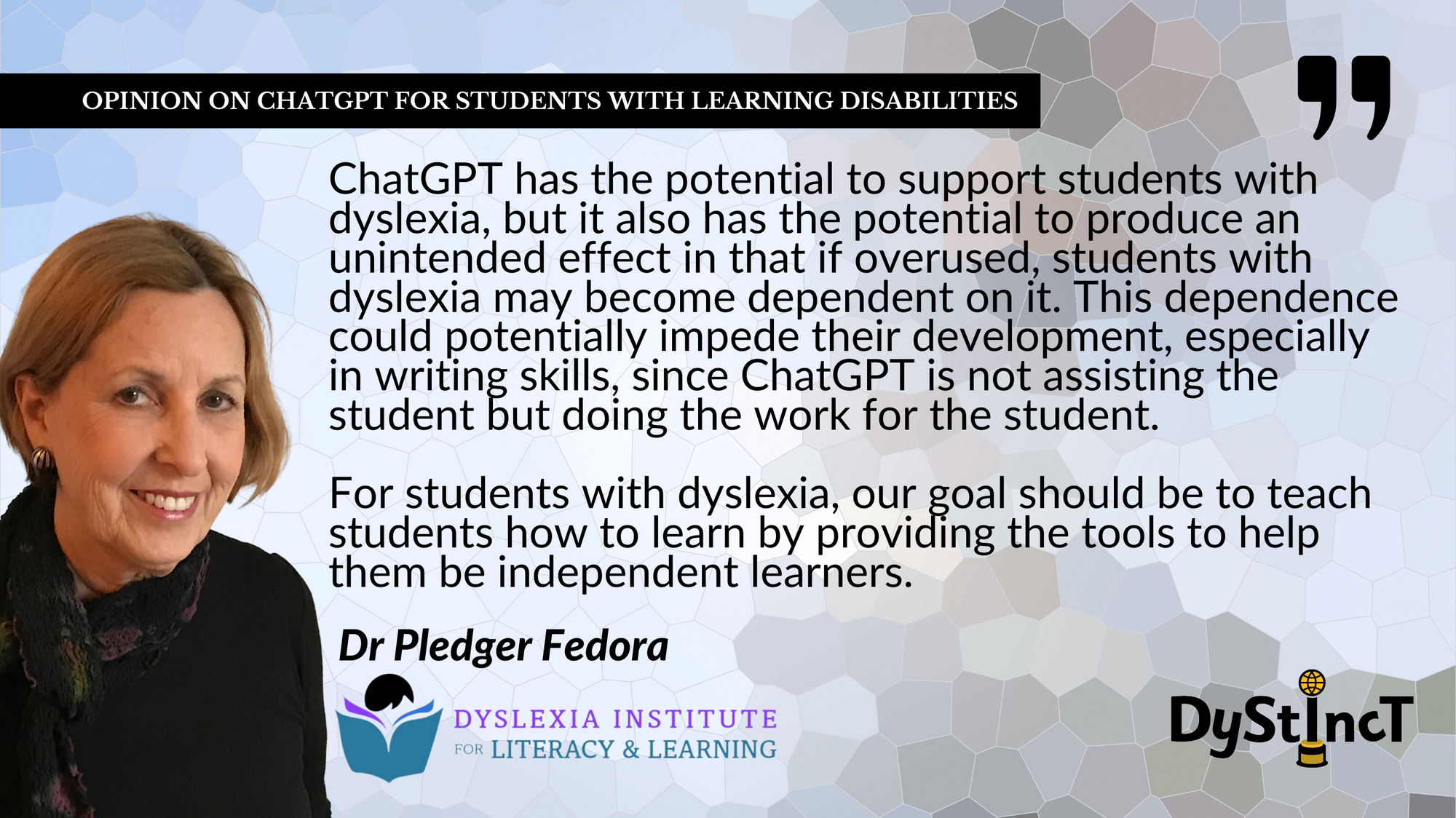

Rosalin Abigail Kyere-Nartey
AfricaDyslexia.org | Facebook | Instagram | Twitter | LinkedIn
While I acknowledge the significant impact it could have for adults with dyslexia, I also have some concerns regarding its use.
In my opinion, every child with dyslexia has the ability to learn how to read and write through a variety of methods, and therefore I am cautious about introducing assistive technology to young children. I believe it is important for children to experiment with different learning methods and determine what works best for them, as well as foster their creativity. However, for high school and university-level students, using assistive technology as an accommodation can be a useful tool.
I am worried about the potential for limiting a child's creativity and learning potential by relying too heavily on technology at an early age.
As someone who was diagnosed with dyslexia later in life and never received any intervention, I can attest to the ongoing struggles I face with reading and writing. However, as an adult, I would welcome any technology that can make my life easier. I have started using ChatGPT and have been impressed with its capabilities, but I have also discovered that a creative prompt is necessary to get the desired output. This requires a certain level of creativity that not everyone may possess.
In conclusion, while I believe that assistive technology like ChatGPT can be of great benefit to individuals with dyslexia, it is important to carefully consider the appropriate age at which to introduce it to young dyslexic individuals. This will ensure that we maximize its potential and minimize the risk of limiting children's creativity and learning ability.
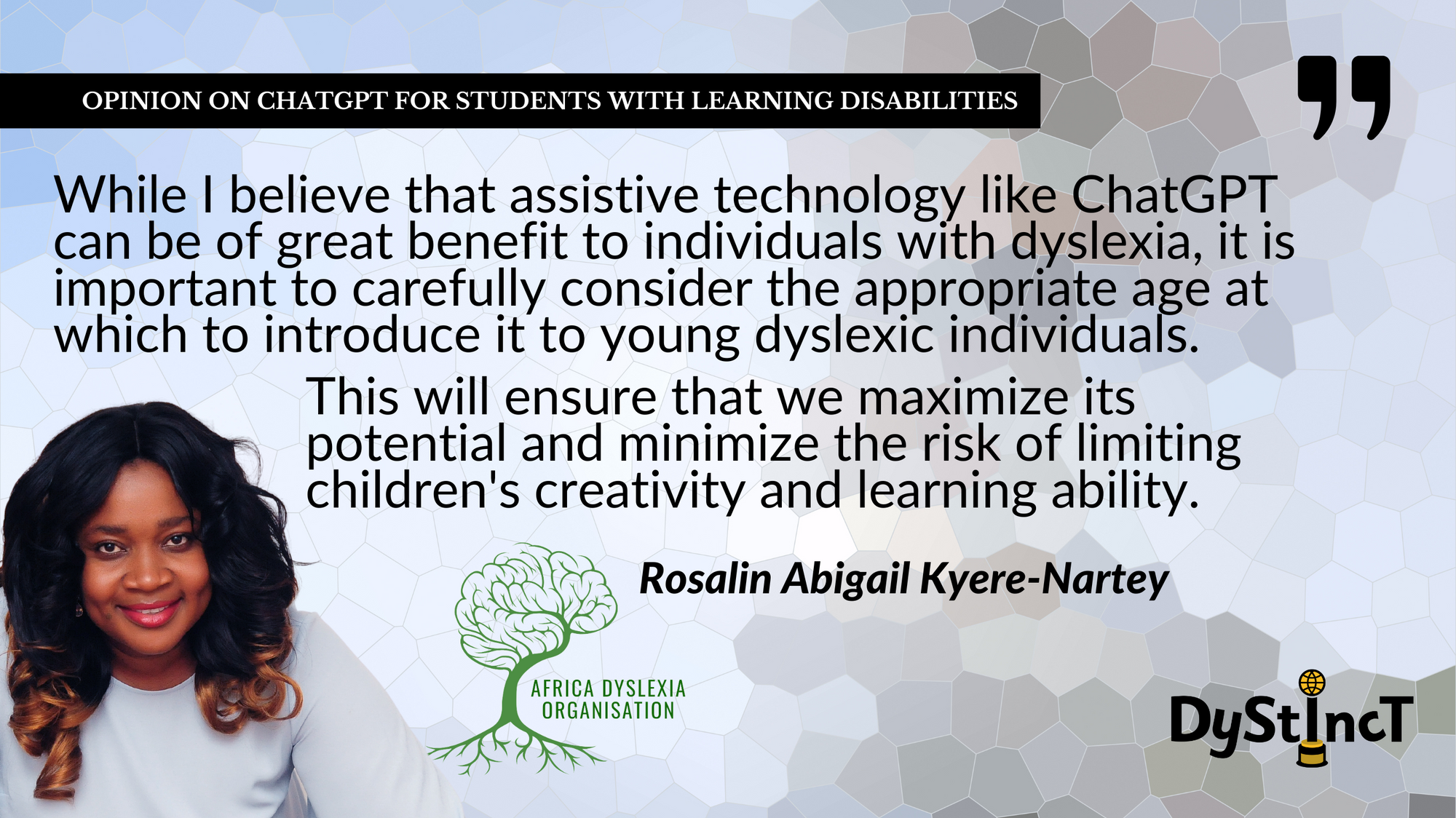

Simon da Roza
XceptionalLearners.com | Facebook | Instagram | YouTube | LinkedIn | Pinterest
The rapid development of technology forces societies to adapt quickly to evolving technologies and to re-evaluate and reflect on the moral, ethical and legal implications. Artificial Intelligence (AI) will proliferate as quickly as apps have done in the past decade throughout our society. While popular social theories will initially polarise attitudes between our negative bias and hope, a balance will be achieved as it has and is for the advent of past significant technological advancements in education.
AI has the potential to assist neurodiverse students in learning significantly. AI is non-judgmental, and you can ask a million questions without fear of being judged. Furthermore, it can explain complex concepts in small achievable chunks of information, synthesising and condensing information at a pace that suits the learner.
Task initiation, prioritisation skills and anxiety can prevent students from expressing and demonstrating all a student's ideas and learning. AI such as ChatGPT and Jasper will be of assistance in helping students break through this barrier and get started on assessments and assignments.
The most significant shift for educators will be the shift from educators asking the questions to encouraging students to ask better questions, a step towards rethinking the whole teacher/student paradigm, the child-adult relationship. It will allow child-centred inquiry.
Will AI be misused just as surely as calculators were used to write inappropriate words when held upside down? That's the nature of curious play and enquiry and students pushing boundaries. The checks and balances will be created to ensure this advancement is in line with our values and community standards. There does need to be a focus on understanding aspects of AI in order for it to be a beneficial tool for educational purposes.
AI is as confidently wrong as it is confidently correct about information. ChatGPT creates good enough copy. AI products will be much better in future versions, and it will be harder to identify the difference between AI and human-generated documents, which will be an issue if educators do not adapt to focus on questions rather than answers. AI has the potential, as did calculators, to free us of burdensome calculations and allow, perhaps empower us, to ask more insightful questions. Freeing our minds to ask more significant questions that only humans can ask. AI does not ask the questions that insightful, sensitive, curious, insightful humans have the potential to ask.
Finally, AI such as ChatGPT has only read 20% of the internet, and it is established that internet content is bigoted and racist. Has it read academic research, which would influence its understanding and the answers it provides? Has that information had the rigour of peer review or assessment? No. Its limitations and applications will need to be understood, and it is part of our future. We must adapt to use it to our advantage to free our minds to ask more beautiful questions.
~ Stuart Firestein
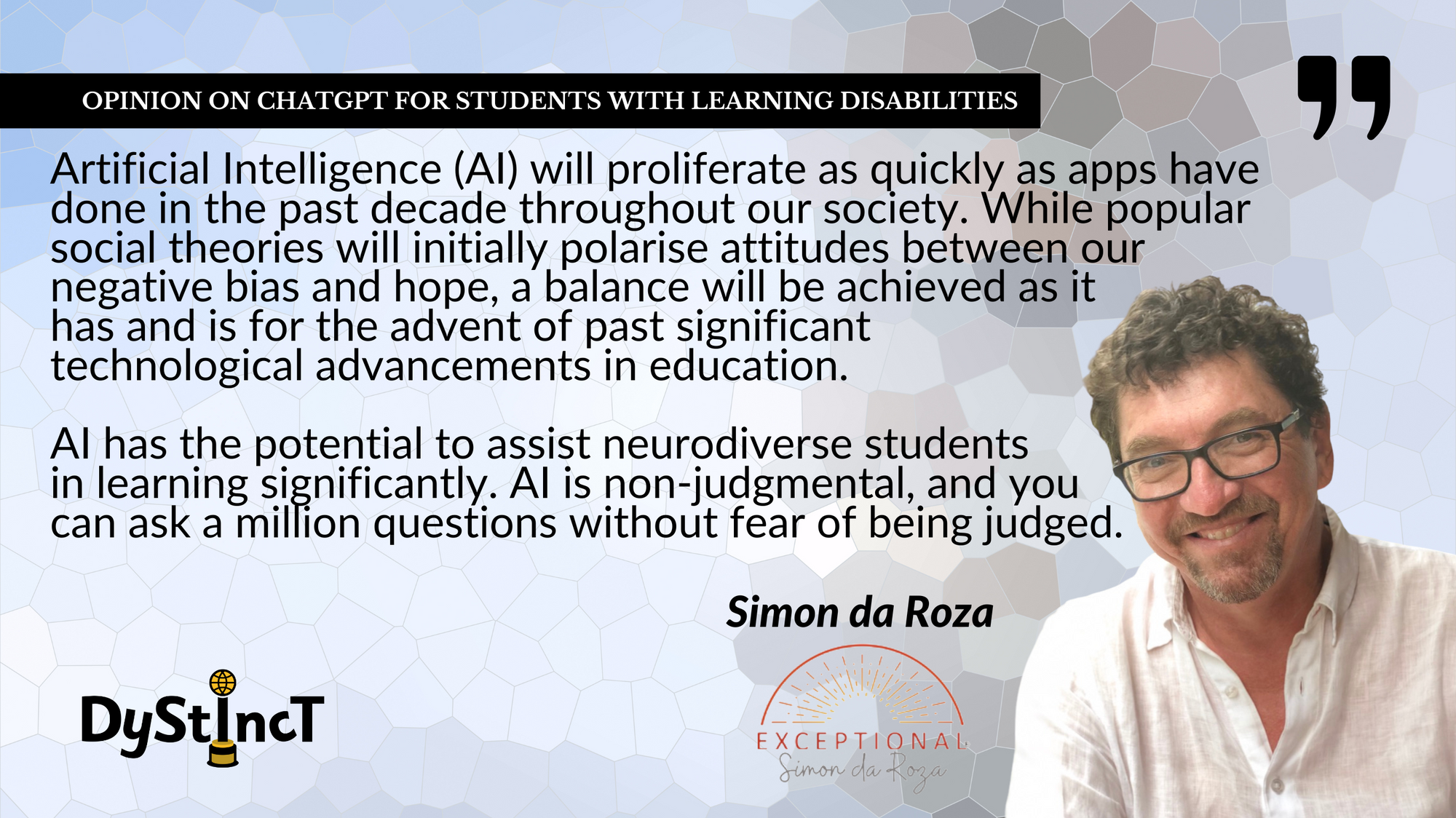

Susan E. Miller
Robinowitz Education Center | Twitter | LinkedIn
ChatGPT - A New Assistive Technology for Dyslexic Individuals?
I wrote my title as a question since many of us in the Dyslexia community are currently debating the possible role of ChatGPT in the academic and workplace lives of dyslexic individuals. Traditionally, assistive technology is meant to "even the playing field." Does the student struggle to get through a long chapter in your biology textbook? Then, let's provide that student with a text-to-speech app to ensure access to grade-level content. In the case of ChatGPT, my colleagues and I don't see it as a tool to "even the playing field" in terms of completing homework. We provide expert instruction, so our students learn different text structures for reading and writing, for example, paired with assistive technology tools for speech-to-text, word prediction, etc. Currently, out of the mouths of our middle and high school dyslexic students, they consider ChatGPT to be a miracle tool to avoid writing and, basically, use it to do their homework. Understandably, the New York City School District, among many others in the United States, banned the AI's use given this initial reaction among students! A new survey conducted by Study.com reported that 1 in 4 educators have caught their students cheating by using the AI tool.
As we go forward with this new AI technology, it is important to openly discuss and explore its potential with our dyslexic students. In one recent class, the students and I experimented with ChatGPT by entering different writing prompts, only to be disappointed with the results. My students noticed that the essay about Samuel Orton was plain and simple and lacked personality - a true voice. What a great lesson! In another lesson, we discovered that ChatGPT is not capable of writing opinion pieces but was helpful in providing a compact summary of information to be used in an opinion essay. The takeaway from that lesson - maybe ChatGPT can be used as a stepping stone for large research projects.
Another important takeaway for my students has been the discussion following my reading of ChatGPT's disclaimer that "the system may occasionally generate incorrect or misleading information and produce offensive or biased content." My students' takeaway was, "ugh, then we have to fact check everything it produces so we don't end up in trouble." Yes, my friend, depending on the nature of the prompt you are giving ChatGPT, it actually creates more work for you, not less. As for citations, if you don't ask for them, you will not be provided with them.
As for educators, you can see that this new technology opens the door for some great discussions involving ethics and the importance and value of the author's voice. We shouldn't keep this new, evolving technology a secret from our dyslexic students, but rather, we need to explore it with them.
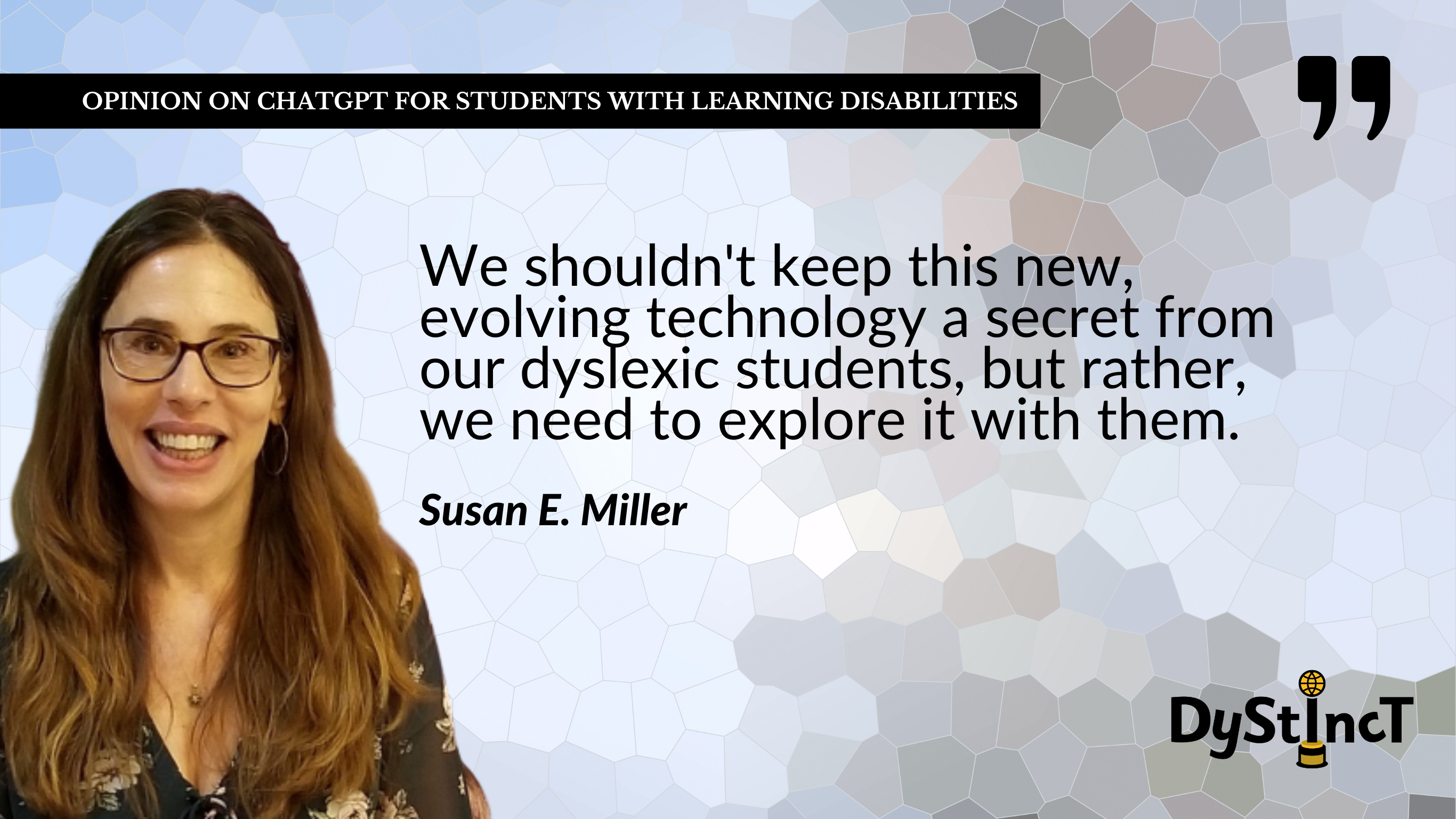

Dr Svetlana Cvetkovic
Translating The Science Of Reading Blogspot | Twitter
Educational controversies are nothing new, so debates about the latest AI search tool ChatGPT are certainly inevitable. I'll start by using a familiar tech example to better understand my viewpoint. The ubiquitous use of smartphones and the like has undoubtedly transformed the way we obtain and think about information. This transformation has, in many ways, enhanced our ability to quickly access knowledge widely. The downside to having vast information readily available at our fingertips is that we still need to be able to critically evaluate the given facts in our grasp. This is why I believe ChatGPT will never replace or hinder the development of critical thinking. Rather, it has the potential to strengthen our abilities to critically think.
Let me explain.
While humans are naturally curious, the act of thinking does not come naturally. In other words, unless cognitive conditions are just right, we tend to avoid thinking. (1) This, according to cognitive scientist Daniel Willingham, is because our brains were not designed to think. However, even though we may not be good at thinking, we still like to think. Thinking, as defined by Willingham, is the act of putting together information in new ways. Thus, for problems to be solved successfully, we need adequate information. This is where ChatGPT can be incredibly useful, particularly to students who have the added challenges of learning difficulties. If we know it takes considerable cognitive effort to think critically about something, why not ease up some of that burden with AI tools such as ChatGPT? In my mind, ChatGPT may offer the "just right" cognitive conditions Willingham describes.
I realize the main argument made by educators is that ChatGPT may impede students' development of critical thinking, but in order to even touch critical thinking, we need sizable background knowledge. Put simply, factual knowledge precedes critical thinking. Knowledge, of course, comes from a wide array of resources, including voracious reading and personal experiences with the world. If a student had limited access to reading widely across their academic journey due to a learning difference, then these students are already at a large disadvantage the moment they step into a college setting. ChatGPT can assist with the information-gathering process necessary for students to proceed with critical thought. That said, a balance must be struck between the types of assignments teachers/professors are asking of students to ensure AI is not the only one doing the thinking.
Subsequently, embedding frequent oral comprehensive exams as course completion requisites may be one balanced solution to the debate. As the saying goes, the one who does the talking is the one doing the thinking. Students can then use AI technology knowing that they will be accountable to orally present the information and be prepared to actively respond to on-the-spot audience questioning. Oral presentations indeed require advanced reasoning skills and demonstrate the student has not only gained substantial background knowledge in the process but was also involved a good deal of time critically thinking and learning about the new information.
All this to say, I don't believe ChatGPT will take anything away. It will only positively evolve our current capabilities for critical thinking, something we're not very good at already. If we're not so great at thinking and if background knowledge is intimately intertwined with critical thinking, then we could use all the help we can get.
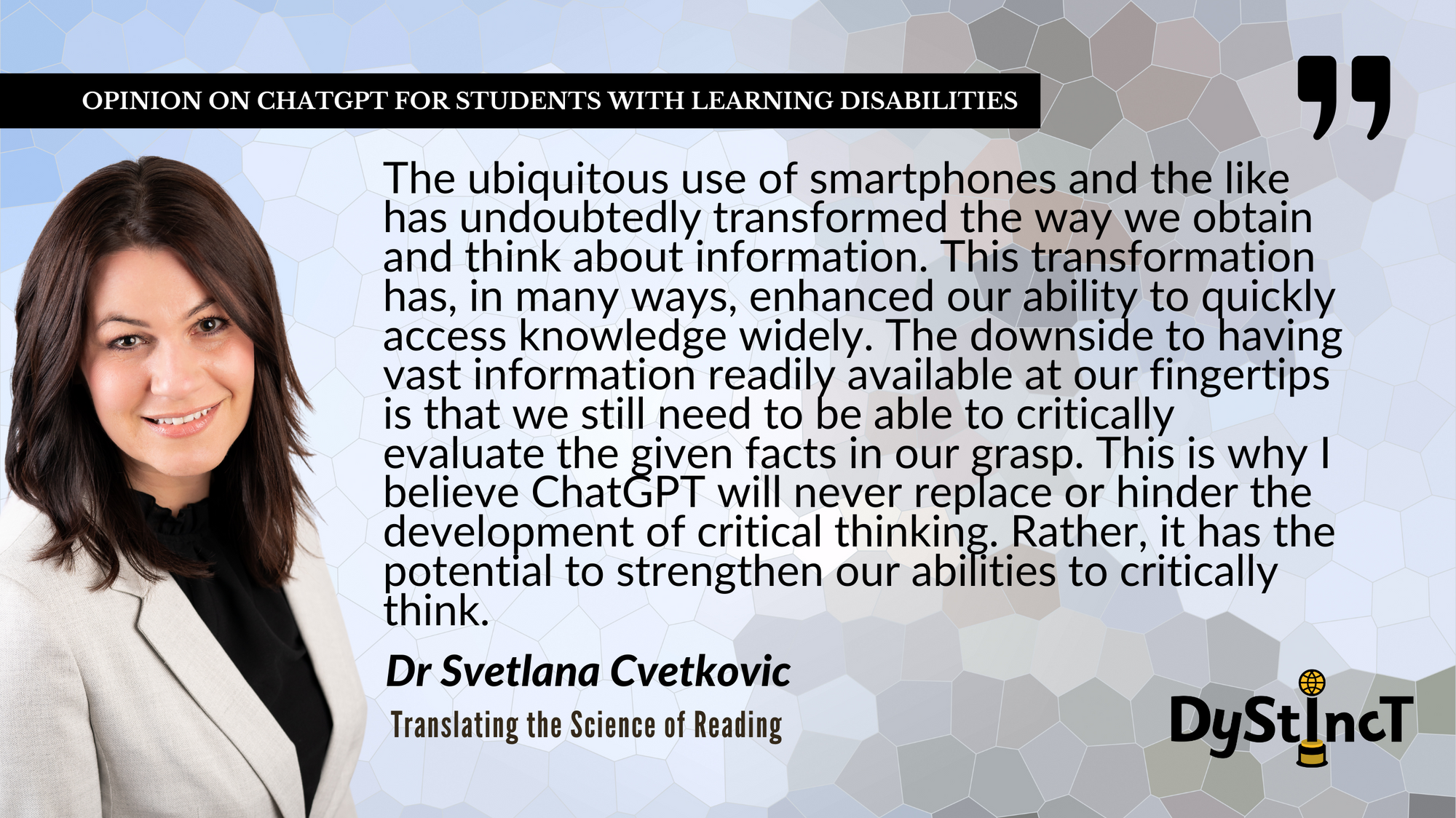

Tonia Glaab
Assistive Technology such as text-to-speech, speech recognition, predictive spelling and editing tools have greatly benefited students with learning difficulties. The arrival of an AI-based chatbot, ChatGPT, however, presents a whole new ball game for students and educators. As the system is able to generate unique, human-like text and responses, valid questions and concerns have arisen regarding its impact on student learning. Will the use of ChatGPT reduce students' critical thinking skills, creativity and knowledge development?
For students with learning difficulties, if used responsibly and appropriately, ChatGPT may assist in providing further learning support and, therefore, enhance knowledge/skill development. Rather than accessing the software solely for the purpose of content creation, students may also use ChatGPT to gain a deeper understanding of topics and assignments; information and concepts may be explained and simplified, questions formulated to clarify meaning, key points identified, and essential details summarised succinctly.
ChatGPT will no doubt be integrated into other commonly used applications in the future. Schools and universities will inevitably adapt their teaching methods and assessment practices to reflect the increasingly ubiquitous uptake of machine-learning systems in education. For students with learning difficulties, ChatGPT may, indeed, prove to be a valuable addition to their tech toolbox!
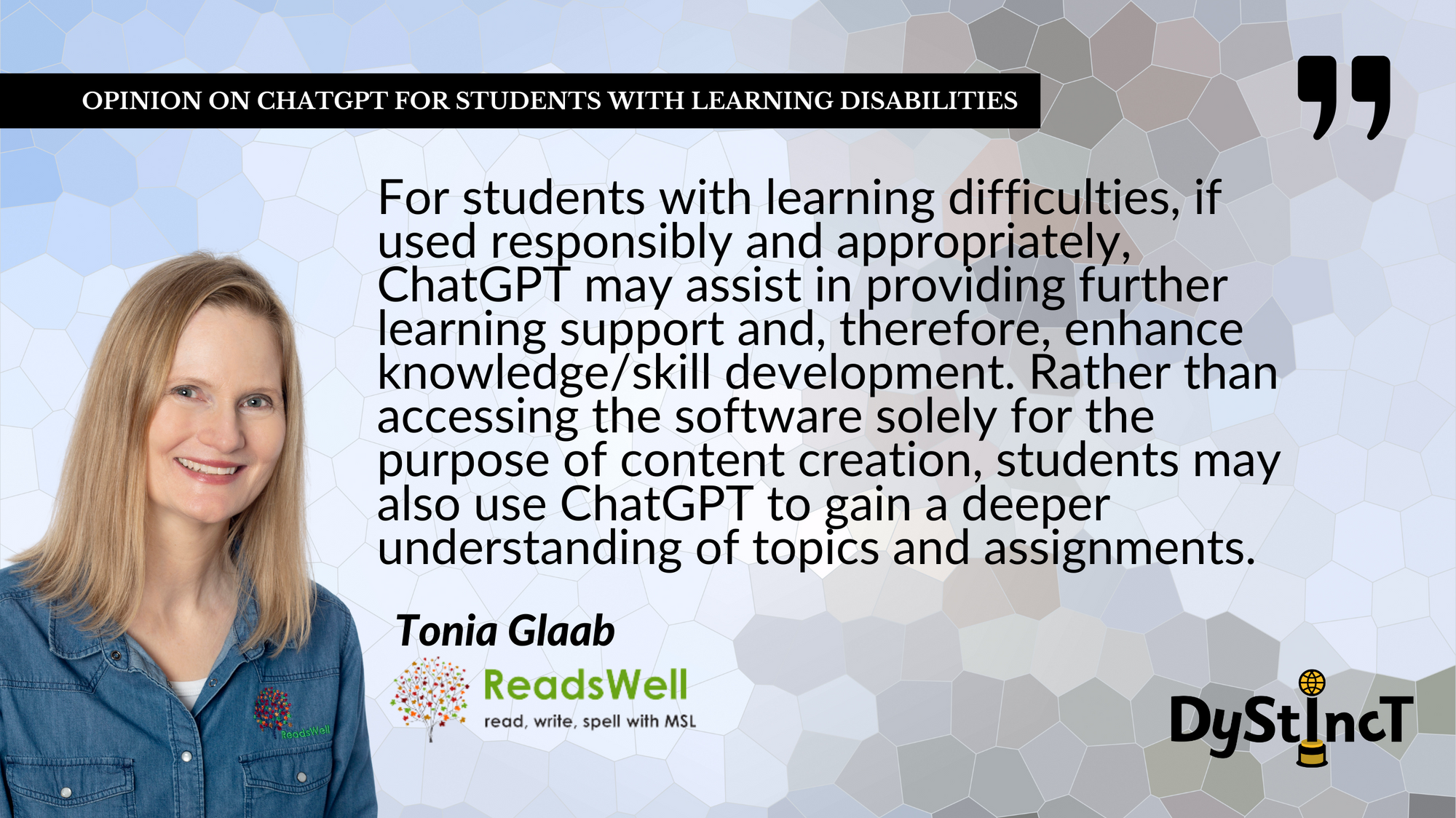

Dr Valdine Björnson
ReadingLeardningClinicManitoba.com | Facebook
The development of ChatGPT, a free AI tool, might be revolutionary. However, even before ChatGPT, we have always searched out answers to deep questions by learning from others. We have sought out our friends, peers, or other academics to reflect and think. We have come to our own conclusions by broad exploration of ideas from others. ChatGPT consolidates all ideas in one streamlined manner, albeit void of contemplation and deeper thought.
There are many issues with this type of technology. We can be sure that the 'voices' heard by ChatGPT have not been broad and deep. The responses using ChatGPT might be biased based on the limited information that is accessible to this system. We cannot be sure that ChatGPT will use vetted, recent, or legitimate sources of information. Further, because of this immediate gratification style of processing information, we will, once again, resort to a fast-processing style of learning and come to conclusions in a superficial way. It might be the next step towards information silos.
AI could force us to think deeper about what it means to be an academic, a successful student, and to be 'smart.' We might begin to consider learning as beyond basic repeating and memorizing. Unfortunately, early on, our students learn that school assesses learning not necessarily on questioning, curiosity, or authentically exchanging ideas. We teach students that learning is about quiet and private contemplation and not the demanding work of grappling with ideas together. As ChatGPT can produce assignments which are based upon the school system's typical evaluation methods, how will we have proof of student learning? ChatGPT might begin a conversation in the education field about what it means to learn and use information in ways that can push and extend our minds and not just complete assignments. In other words, it is our measuring sticks that are the issue.
Most significantly, ChatGPT might level the playing field for those who have the capacity to change the world (those with dyslexia) but are limited by the narrow expectations of relying on only literacy skills of reading and writing to showcase learning. Using literacy skills alone to measure learning has never been an equitable method. As these technologies develop and infiltrate our school systems, it is my hope that our systems will start catching up to the fact that reading-writing skills are not the only method towards 'becoming educated.' In fact, true learning is based upon listening and speaking, creativity, responding to problems, and authentic idea exchanges. We must take advantage of our human skills. We must recognize the superiority of our inefficiencies and messy thinking. By doing so, ChatGPT will just be another tool towards our deeper learning as humans.
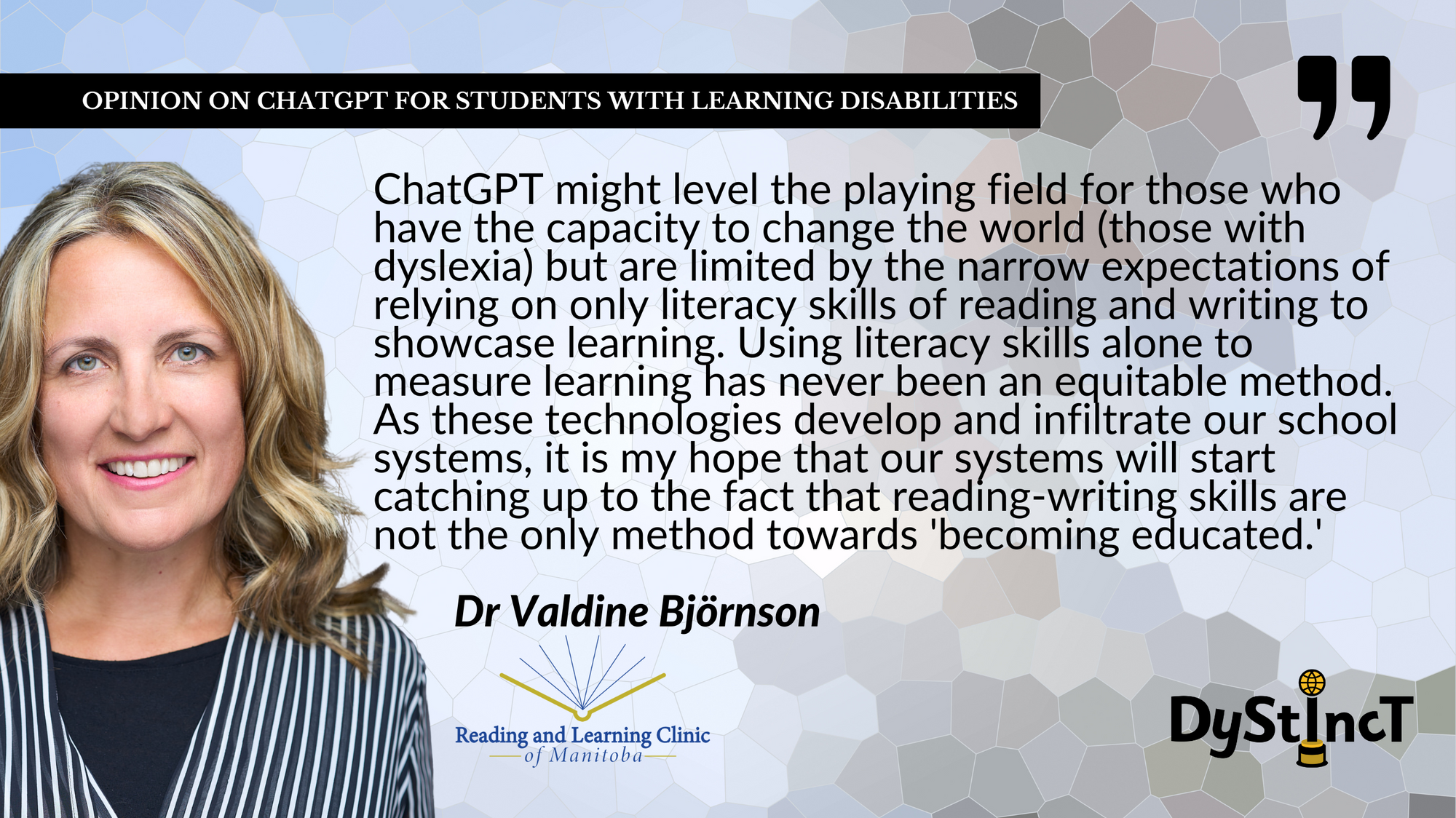

Victoria Leslie
Whilst I can see already that many dyslexic students and parents are celebrating the advent of AI technology like ChatGPT, I am very concerned.
It is important to remember that ChatGPT type AI content-generating applications are different to the assistive technologies that "level the playing field" for students with specific learning difficulties. For example, speech-to-text and text-to-speech technologies are assistive technologies that help with "secretarial tasks". These technologies can help reduce the load on working memory and support cognitive and motor differences. These technologies empower dyslexic students and allow them to express their thoughts.
I must state here that I haven't carried out any research into AI content-generating technologies and that much of my understanding is from non-peer-reviewed articles in newspapers and from 'playing' with the technology. However, I have been asked for my opinion, and I'd say that I am very concerned. It is a very clever piece of technology, and it does what most teachers try to teach their students to do; it uses the internet to find textbook articles, academic research and media articles and then summarises them in an essay or academic paper. Of course, many learners and their parents are excited by this because reading articles and then organising a summary of them is one of the hardest things for students with processing difficulties like dyslexia and ADHD to do. However, we must see this assistive element as different to the other kinds of assistive technology mentioned above because if we encourage its use, we are encouraging the outsourcing of human thought. Formulating ideas is central to the psychology of learning. If we allow our students to outsource the "thinking" part of essay writing to a machine, even if we argue that we are only using it as revision or preparation, our students' understanding will remain superficial.
The most concerning element of ChatGPT for me is the advertent or inadvertent encouragement of plagiarism. If we encourage the use of this technology for revision or for modelling, we are allowing students to begin to think and feel that they don't need to try to engage with a subject because the computer can do it more effectively and efficiently. Although I can envisage many strong arguments in favour of modelling answers, my fear is that we will teach students to cheat and encourage learned helplessness in the process. It is naive to believe that many students won't be tempted by an easier way out of an essay or research project they are struggling to complete.
The consensus seems to be that ChatGPT can write a solid C English high school essay. Personally, if it becomes sophisticated enough to scan a student's essay and then remodel it in a way that teaches them how to reorganise their own thoughts and express what they have already written more effectively, then this would be interesting software. However, I am concerned that we might have outsourced our students' ability and confidence to think independently before this level of support becomes available.
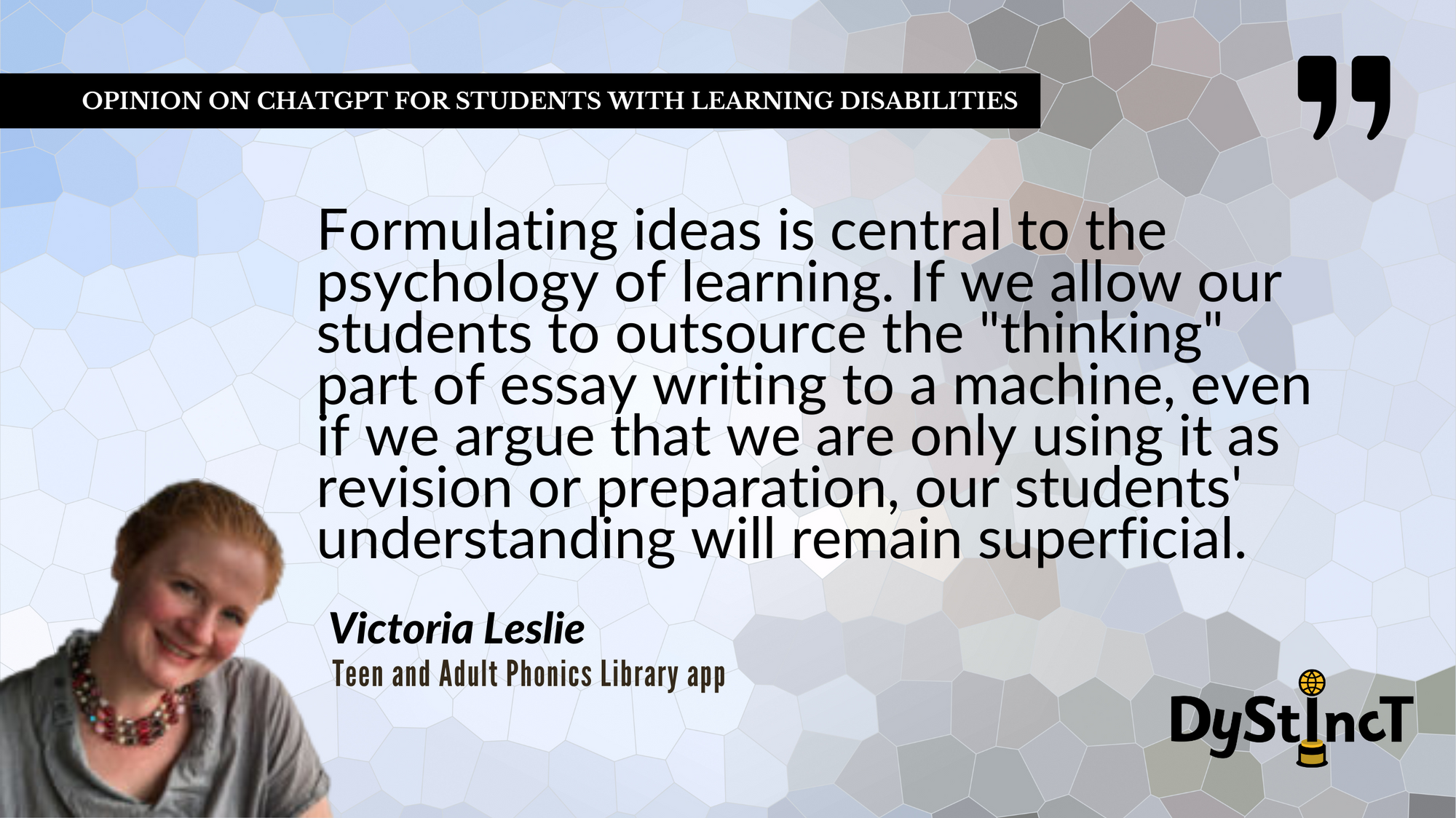

So what do you think?
Let us know in the comments below.
By considering the above insights shared by the specialists in the field of learning disabilities, I hope you can form an informed opinion on whether or not ChatGPT will become a prevalent feature in your households and classrooms.
Although its still too early to come up with a fool proof plan to effectively incorporate AI in education, one thing is certain- if we simply lament the potential negative impacts of AI on education, we miss an opportunity to guide students into a new and exciting world.
It's important to be proactive in finding ways to use AI to our advantage in the education sector, rather than being complacent and accepting defeat.
Thank You
Zahra Nawaz Shafeeq


